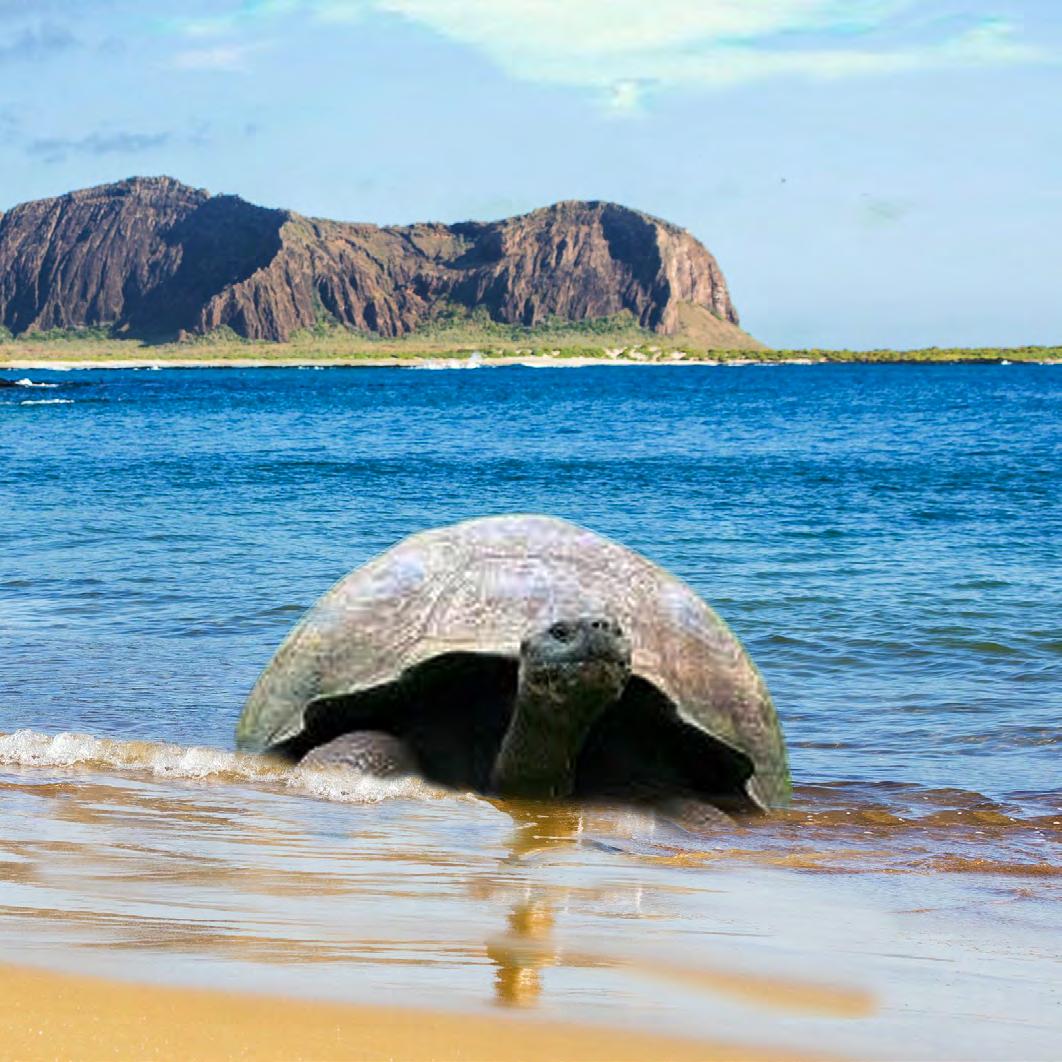
Number 3 / July 2023 English version 1
2
3
© Of this edition Inter-American Association of Intellectual Property (ASIPI), Panama 2023 www.asipi.org
 Enrique Díaz President of ASIPI
Juli Gutiérrez Director
Natalia Tobón y Marcela Montañés Editors
Saúl Alvarez Lara Design
Enrique Díaz President of ASIPI
Juli Gutiérrez Director
Natalia Tobón y Marcela Montañés Editors
Saúl Alvarez Lara Design
Disclaimer
All the content of this Magazine is offered for informational purposes only. The editorial team tries to make it as precise, faithful and current as possible. However, ASIPI is not responsible for omissions or typographical errors and reserves the right to update, modify or delete the content and access to the magazine at any time. Responsibility, for the opinions expressed in the signed articles, studies and other collaborations lies exclusively with their authors.
ASIPI does not guarantee that the technical and operational functions of the electronic magazine will be uninterrupted or error-free or free of viruses or other harmful components. Under no circumstance, ASIPI may be required to respond for any kind of damage or loss resulting from the use or consultation of the magazine. It is possible that the magazine includes links, links to external websites, whose contents and design are outside the control of ASIPI. In no case is the association responsible for its content, timeliness, accuracy or quality, nor should it be understood as the support or promotion of third-party products and/or services.
Cover Galapagos Islands
The Galapagos Islands, also known as the Columbus Archipelago, are located approximately a thousand kilometers west of the coast of Ecuador. In 1535, by accident, the ocean currents diverted the ship of Friar Tomás de Berlanga and led him to an archipelago that the cartographer Abraham Ortelius, in the year 1570, named the Galapagos Islands due to their resemblance to the shells of the turtles that inhabited the archipelago. It is made up of twenty-two large islands and over a hundred small islets, serving as the habitat for dolphins, whales, sharks, iguanas, lizards, seals, sea lions, cormorants, and other endemic species. In 1978, UNESCO declared them a World Heritage Site for being one of the most important marine reserves. The Galapagos Islands were the refuge of Lonesome George, the last known male specimen of the giant tortoise species Chelonoidis abingdonii, who passed away in 2012. In 1959, the islands were declared a National Park and have been featured in novels by writers such as Herman Melville, Georges Simenon, and Kurt Vonnegut. It is one of the most visited marine ecosystems by tourists from around the world.
Source: (Wikipedia, Universidad de Helsinki, Go Raymi)
4
Editorial 6 FOREFRONT 8 LIBRARY 56 DIALOGUE 14 SO IT WAS IN QUITO 58 Balance 18 RESERVED SPACE 89 Voices 23 UPCOMING EVENTS 93 WITHIN THE REGION 30 WELCOME 94 ALL ABOUT YOUR HEALTH 44 100 A LA CARTE THE BILLBOARD 38 YOUTH ZONE 96 TO REMEMBER IS TO LIVE AGAIN 47 EXPAND YOUR VOCABULARY 104 40 THE ACADEMY ON THE RADAR 98 RES JUDICATA XXII ASIPI Congress 2023 / Mexico 54 108 CORNER OF HUMOR OR REFLECTION 105 CONTENIDO 5
As professionals in this field, we know how important it is to stay up to date with the latest trends and developments in this field. That’s precisely why we have chosen an analysis of the impact of ChatGPT on the way intellectual property is created, managed, and protected as the central theme of this issue.
ChatGPT is just one type of the so-called advanced intelligence or artificial intelligence that enables greater automation and efficiency in various processes. AI-powered data analysis tools allow creators and copyright holders to identify unauthorized use of their work online, facilitating the protection of their rights and the recovery of income. Additionally, AI can also help creators identify monetization opportunities for their intellectual property, allowing them to derive greater value from their work.
Regarding the management of intellectual property, AI can change the way intellectual property rights are registered and administered. For example, AI can assist organizations in maintaining more accurate and efficient tracking of their patents, trademarks, and copyrights, enabling informed decisions about their intellectual property portfolio.
Everything mentioned above is perfectly fine except for something very important: I didn’t write the two paragraphs above. They are part of a response I received, free of charge, from the chat.openai.com assistant when I asked, “Develop this idea: humanity is changing the way it creates, manages, and protects intellectual property thanks to artificial intelligence.”
Nobody denies that it is a helpful tool, but who guarantees that the system has been fed with verified, relevant, and unbiased information? What if it had answered me that thanks to artificial intelligence, we don’t need to create, protect, or manage intellectual property because it is an
Enrique Díaz President ASIPI 2021 -
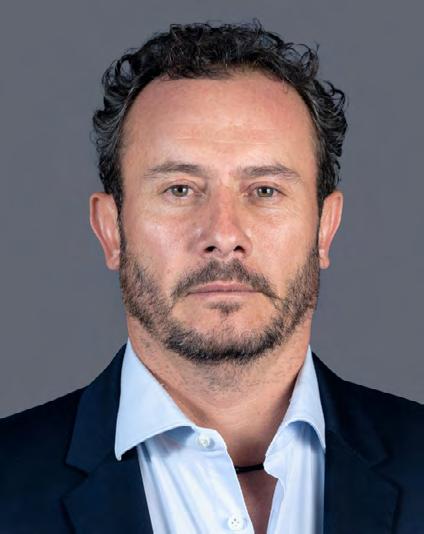
Editorial
6
2023
area of knowledge resulting from capitalism that no longer has a reason to exist? ASIPI asks itself many questions, and that’s why we believe that powerful AI systems should be developed only once we are sure that their risks will be manageable.
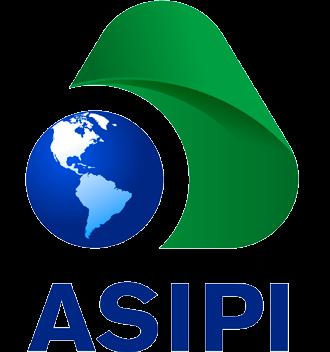
Not surprisingly, the leading creators and developers of AI have decided to pause their development until they are certain they are on the right track and that the outcome will benefit humanity and society instead of harming it. While it is a fascinating topic, it can also be daunting and risky, so it is essential to analyze it correctly, but above all, to have legislative mechanisms for its proper development, supervision, and, most importantly, control.
I present you with the magazine, allowing you to delve into these ideas and I extend an invitation to explore our renowned sections: “Dialogue,” featuring an interview with Megan Carpenter, Dean of the University of New Hampshire Franklin Pierce School of Law, an esteemed institution with which we have formed an alliance; “Radar,” keeping you informed about the latest developments within our colleagues’ firms; “Remembering is Living,” “The Billboard,” “Balance,” “Res Judicata,” “Expand Your Vocabulary,” and many more.
We hope that these articles will be very useful to you and provide you with valuable insights for your practice. As always, we strive to ensure that our review is a platform for discussing relevant and current topics, and we hope that this issue will be interesting and informative for you.
We appreciate your continued collaboration and support for our magazine, and we look forward to remaining a valuable source of information for our community of intellectual property specialists.
Sincerely,
Enrique Díaz
7

FRONT PAGE 8
Artificial intelligence (AI) has quietly permeated our everyday lives, transforming the way we interact with the world around us. Daily, we encounter computer programs capable of drafting contracts, conducting research, designing architectural structures, diagnosing diseases, and even creating artwork. This reality demands careful analysis, especially from intellectual property specialists, which is why ASIPI Mundo has decided to dedicate this section to examining the topic from various perspectives.
Let’s start by pointing out that artificial intelligence (AI) is a broad term that refers to machines’ ability to independently perform tasks that would normally require human intelligence. Some of the applications of advanced artificial intelligence include Machine Learning, which is a technique that allows systems to automatically improve their knowledge through experience; Computer Vision, which is the ability of machines to interpret and analyze images and videos in real-time; Robotics, the science of designing and building robots; and ChatGPT (Generative Pre-trained Transformer).
PROTECTION OF INTELLECTUAL PROPERTY IN A WORLD OF TECHNOLOGICAL ADVANCEMENTS AND INTELLIGENT ALGORITHMS

9
The ChatGPT is a language model developed by OpenAI based on deep learning technology. It allows the computer to absorb large amounts of data from the internet and generate immediate responses to questions, write poems, perform translations, generate customized marketing strategies, design personalized games, and even generate software programs using languages like Python, JavaScript, and others. However, there are other programs with similar functionalities developed by different companies, such as T5 (Text-to-Text Transfer Transformer) developed by Google Brain, BERT (Bidirectional Encoder Representations from Transformers) developed by Google, and XLNet from Google Brain and Carnegie Mellon University, just to name a few.

And it’s not just about creating language models. There are AI tools and programs used to generate videos, presentations, and create music. We refer, for example, to Deepfake, which is a technology that uses artificial intelligence to realistically synthesize and sometimes manipulate existing videos by replacing faces and voices. We also have Adobe After Effects, widely used software in the film and animation industry for creating visual effects and generating high-quality audiovisual content. Although it is not specifically an AI tool, it can be combined with machine learning techniques to enhance workflow and improve the quality of generated visual effects.
Another case is Jukin Media, a company that utilizes artificial intelligence algorithms to automatically classify and analyze large volumes of user-generated video content, enabling them to create compilations and video presentations that can go viral on various topics. Amper Music is a platform that employs AI algorithms to automatically compose original music for videos, presentations, and other projects, adapting the style and duration based on user preferences. Magisto is an AI-based tool that allows users to create engaging video presentations from existing photos and clips.
Tools for Generating Videos and Music Deepfake After Effects Jukin Media Amper Music Magisto Advanced artifical intelligence Machine Learning Computer Vision Robotics ChatGPT Some models based on AI ChatGPT T5 Bert XLNET
10
… And it’s not just about creating language models. There are AI tools and programs used to generate videos, presentations, and create music…
These are just some of the AI tools available for generating texts, videos, presentations, artwork, and music. However, it is expected that in the near future, there will be many more tools as this technology is constantly evolving.

As experts in intellectual property, we recognize that all these applications are causing a significant transformation in how humanity creates, protects, and manages intangible assets. We are aware that we must thoroughly prepare ourselves to address the opportunities and challenges that this evolution brings.
For instance, there are language models capable of creating works subject to copyright protection. However, certain tests must be overcome, such as determining the ownership of the inputs or data used to train the algorithms that give rise to the AI models. Often, these data themselves are protected by copyright, raising the need to determine the extent to which the owner’s authorization is required to use such content. It may be necessary to establish exceptions that allow for the use of such content without authorization.
A second challenge relates to the protection of AI models themselves. This includes protecting the resulting software through copyright, potentially safeguarding databases through trade secrets, and, if the program can be characterized as a computer-implemented invention, seeking protection through patents.

The third challenge is related to the outputs, that is, the results derived from inputting data into an artificial intelligence model. It
can be a simple decision, more data, or even a new artistic creation, which can occur when the system is fed with previous intellectual creations. This raises several questions: Can the result derived from the artificial intelligence model be qualified as a work eligible for copyright protection? Who should be considered the copyright holder of that work: the individuals behind the AI system, the AI system itself, or both? Is it a work that should be understood as belonging to the public domain?
“Zarya of the Dawn” 1 is one of the most cited cases today regarding this matter. It is a graphic novel created using the Midjourney platform by an artist named Kristina Kashtanova. This artist initially filed a copyright registration application in the United States, and the competent authority granted a copyright registration for the literary work, including its images. However, upon further investigation and determining that the images were derived from an AI system, the United States Copyright Office (USCO) canceled the initial registration and issued a new one, excluding protection for the images, considering them lacking in originality due to insufficient human involvement in the creation process. Nevertheless, this process generated several questions: Does the use of unlicensed images to train generative AI violate the law? Do AI platforms have secondary liability for infringing protected works?
To address some of these questions, in March 2023, the USCO published a document titled “Copyright Registration guidance: Works
https://jolt.law.harvard.edu/digest/zarya-of-the-dawn-how-ai-is-changing-the-landscape-of-copyright-
“Zarya of the Dawn: How AI is Changing the Landscape of Copyright Protection By Tony Analla.
protection.
11
1.
Containing Material Generated by Artificial Intelligence,” which establishes criteria for registering works that contain material generated using these technologies.
However, the discussion does not end here, especially as we have not yet addressed the topic of patents. It is evident that with AI, it is possible to design programs trained to conduct searches and draft patents more accurately than many humans would. In fact, these programs can monitor the patent market and alert companies to potential infringements. Moreover, it appears that AI can now autonomously develop inventions, understood as the ability to make decisions, and carry them out in the external world without external influence or control.
Currently, the majority of legal systems structure patents around the concept of a natural person as the inventor. For example, U.S. law refers to an inventor as a natural person, as opposed to a legal entity. European law indirectly follows this thesis since the entire system is structured around a natural person (the forms require the name, surname, and address to designate the inventor). That is why Luz Sánchez, a Spanish professor who participated as a speaker in the panel “The Perplexity of Intellectual Property Law before the Emergence of Artificial Intelligence” at the XXII Virtual Work Sessions and Administrative Council of ASIPI in 2020, suggested the possibility of proposing to legislators the concept of electronic personality. This concept would be recognized in cases where intelligent agents generate inventions based on autonomous decisions independent of third parties.
Up to this point, we could conclude that advanced AI is a neutral technology with the potential to improve the efficiency of various
processes or procedures for the benefit of humanity, while only generating some legal concerns. However, it is also true that this technology could be used to carry out harmful actions and malicious purposes. After all, AI models learn from extensive datasets, and if these datasets contain ideological biases, cultural, political, or gender stereotypes, there is a possibility that the resulting model will also reflect them.
This dual personality is observed, for example, in AI systems used for automated decision-making in areas such as public or private contracting, loans, or the justice system. While these systems can standardize and streamline processes for the benefit of stakeholders, if they are biased, they could perpetuate corruption or amplify discrimination against certain ethnicities or genders.
The same is true for content recommendation algorithms, such as those used in social media or streaming platforms, which often show users content similar to what they have interacted with before in order to generate views or traffic. This can create “filter bubbles,” where people only see information and opinions that reinforce their own perspectives, creating divisions and polarization in society.
Furthermore, advancements in AI have led to the development of techniques such as generating high-quality fake text or images that can be used for ideological purposes, spreading fake news, or manipulating elections, as seen in some countries in recent years 2
For experts like Luis Fernando Pabón, a Colombian strategy consultant at “The Cocktail,” a multinational advertising and marketing company that is part of the Wunderman Thompson group, it is crucial to ensure that AI is developed and used ethically. This entails implement -
In Forbes magazine: https://www.forbes.com.mx/manipulaciones-mediante-ia-prolifera-elecciones-estados-unidos/. Article titled ‘Manipulations through AI proliferate ahead of US Elections,’ May 30, 2023.”
 2.
2.
12
ing unbiased data collection practices, designing fair and transparent algorithms, and conducting regular audits and reviews to identify and mitigate ideological biases.
Pabón believes that if the accuracy and truthfulness of the data provided to the system are not regulated or controlled, humanity faces many dangers. That’s why he suggested to ASIPI Mundo to consult the open letter to the public issued by the “Future of Life Institute” in March 2023, titled “A Pause on AI Experiments.” In this letter, a call is made to all AI laboratories to suspend, at least for 6 months, the experiments they are conducting. The signatories, which include over 30,000 individuals including Steve Wozniak (Co-founder, Apple) and Yuval Noah Harari (Author and Professor, Hebrew University of Jerusalem), argue that before “advancing” further in this intelligence, we need to ask ourselves as humanity which jobs we are willing to automate and how much control we are willing to hand over to machines.


Upon reading the document, it is evident that the mentioned Institute is not against research in these matters but warns that powerful AI systems should only be deployed when we are certain that their effects will be positive and their risks manageable.
To achieve these objectives, the Institute provides specific recommendations: All actors and laboratories should collaborate in the implementation of a set of security protocols that are thoroughly supervised by external and independent experts. This will help achieve more accurate, secure, interpretable, transparent, robust, aligned, reliable, and ethical AI products. Additionally, the Institute suggests
that AI developers work together with lawmakers to expedite the development of governance systems, establish a strong ecosystem of auditing and certification, and enact liability standards. The Institute also proposes the allocation of public funding for AI safety research and the creation of institutions capable of addressing the economic and political implications, especially concerning democracy, that AI could generate.
In line with this approach, the European Union (EU) has been working for several years on the development of new regulations to govern the development and use of artificial intelligence, known as the Artificial Intelligence Act (AI Act). This regulation aims to strengthen ethical standards, data quality, and transparency in the field of AI and establishes a risk classification system to assess the impact these programs may have on fundamental rights. In fact, the proposal requires that citizens be informed when interacting with an automated agent and imposes significant penalties for those who fail to comply with these rules. Although this regulation is not expected to be ready before 2024, the European Commission aims to become a global benchmark in regulating this technology, following the example of the General Data Protection Regulation (GDPR) implemented in 2015.
In conclusion, the topic we have explored in this article undoubtedly raises many debates. While we have approached it from various perspectives, it is essential to recognize that much remains to be discovered and analyzed. For example, we have not addressed surveillance practices for data collection and the risks to users’ privacy.
13
… powerful AI systems should only be deployed when we are certain that their effects will be positive and their risks manageable…

DIaLOGue Megan Carpenter
14
DEAN OF THE FRANKLIN PIERCE SCHOOL OF LAW
1. You are the Dean of the Franklin Pierce School of Law. ASIPI has had relations with that university for decades, but we recently signed a scholarship agreement with you. What does the agreement consist of?
Over the next five years, UNH Franklin Pierce will offer in excess of $1.2 million in full-tuition scholarships for ASIPI members. These scholarships include one full-tuition scholarship per year to its Hybrid JD in Intellectual Property, Technology, and Information Law; two annual full-tuition scholarships to the residential or online Masters of Law in IP (LLM), or our Masters in Intellectual Property (MIP); and three full scholarships annually to the Franklin Pierce Intellectual Property Summer Institute (IPSI). Interested candidates will respond to essay prompts provided by ASIPI

This year we received many applications and have awarded our first scholarships. We will welcome students from Peru, Brazil, Colombia, Argentina, Panama, and the Dominican Republic. We can’t wait to welcome these students to our community!
As part of the agreement, the law school and ASIPI will also initiate a series of online and in-person events for members that offer special rates for attendees of either organization. That includes an annual academic course sponsored by both parties. In addition, ASIPI will include UNH Franklin Pierce professors at its annual events.
2. How does the university and the members of ASIPI benefit from this alliance?
ASIPI is the leading regional organization dedicated to the promotion of IP across Latin America. UNH Franklin Pierce is the leading US law school dedicated to the study of intellectual property law. It is a match made in heaven!
At UNH Franklin Pierce, we value our alumni across Latin America and are thrilled to enter into this partnership with ASIPI. Our relationship exemplifies the thought-leadership of UNH Franklin Pierce and will facilitate the education of global IP leaders across Latin America and around the world for years to come, at a time when IP issues are critical for the global economy and the future of our society.
3. Why is Franklin Pierce so important in the area of IP?
Franklin Pierce provides an unparalleled education in intellectual property—we have more than 60 intellectual property courses in our curriculum, and over half of our faculty have IP expertise. Franklin Pierce also has an unparalleled network of alumni around the globe, with global heads of IP having served at places like Bayer, Disney, Samsung, WeWork, Microsoft, Lego, LG, and TSMC. Franklin Pierce alumni also lead law firms across Latin America. By attending Franklin Pierce, ASIPI members can
15
be connected to IP leaders who will advance their careers. They will also learn about the latest developments in IP law and be prepared for future challenges.
Our program teaches students to be on the cutting edge of intellectual property issues. We have over 60 IP courses in our curriculum, more than any other school in the United States. Our approach is not just theoretical, but practical – students learn skills they can apply in practice that will help them navigate complex IP issues. We also have a faculty that takes a personalized approach. At Franklin Pierce, students make lifelong connections and friendships.
4. What can you tell us about the surroundings of the university? from Concord, New Hampshire?
UNH Franklin Pierce is in an idyllic setting in Concord, New Hampshire, walkable to downtown and next door to a park. Within an hour you can be sitting on a beach beside the ocean, hiking up (or skiing down!) a mountain, canoeing down a river, or eating dinner in one of the largest and culturally significant cities in the United States—Boston, Massachusetts. Our students who live here not only have a lifelong affection for the law school, but also for our unique community and surroundings.
5. How have Latin American students fared at that university?
Many of the intellectual property leaders across Latin America are graduates of Franklin Pierce. Whether in leading law firms like Olivares in Mexico or Dannemann Siemsen in Brazil, leading the INPI office in Argentina, or serving as trademark counsel for Lego, our graduates stand out among the crowd as IP stars, helping to carve a path for the future. Our students also develop connections that benefit them throughout their careers. One of our Latin American students told me that the con-
nections he made at Franklin Pierce have helped him get jobs and clients, have helped him hire people into his firm, and have given him a global network of business opportunities and friends.
6. From your position as Dean of such a prestigious university, where do you see intellectual property going? What characteristics should an IP agent have at this time?
From data and artificial intelligence, to entrepreneurship and innovation, to health care, finance, and climate change, intellectual property is at the center of many of the grand challenges we face as a global society. Having a global perspective on issues in IP can help us turn those challenges into opportunities.
A global approach to IP is valuable, and will be more and more important in the coming years. As the legal framework surrounding human creativity, intellectual property is relevant across industries, and provides the foundation for innovation and invention. Transactions in IP are the system of movement for innovation around the world. It is my belief that an education in intellectual property will be valuable no matter what industry or specialization one is in, that as technology develops, intellectual property is the foundational education of the future.
We are particularly grateful to the leadership of ASIPI for sharing our commitment to educating the IP leaders of tomorrow, including Enrique Diaz, Luis Henríquez, Jorge Chávarro, Matias Noetinger, Martin Pittaluga, Giselle Reuben and Juli Gutiérrez. The executive committee and the entire administrative team have always been attentive to all the details of this agreement to ensure its success. We are happy to work with ASIPI

16

17
Balance
We often greet our associates with the slogan “ASIPI in Motion”. With it, we want to express that we don’t stand still, and thanks to the work of everyone—membership, Executive Committee, and administrative staff—we constantly drive our projects forward and overcome the challenges that arise. The first semester of 2023 was no exception, and thanks to teamwork, we are pleased to present the following results:
ASIPI

In April of this year, the first edition of the 2023 Scholarships competition, awarded by the Franklin Pierce School of Law based on merit to members of our association who apply and participate in the competition, concluded with great success. The winners were:
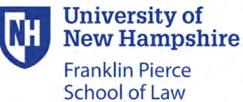
The Evaluation Group was composed of Jorge Allende, Diana Arredondo, Mercedes Castells, and Roberto Ríos, who had the difficult task of selecting among high-level legal works presented by our participating members.
Victor Kronemberger
Dannemann Siemsen
Brazil
Alejandro Castro
Andean Union
Peru
Andrés Rodríguez
Novus Estrategias Legales
Colombia
Juan F. Porta
Rylan - Lussich Associates
Argentina
Julissa Farah
Estudio Benedetti
Panama
Laura Castillo
Innventiva Legal
Dominican Republic
ASIPI 2023 Scholarships University of New Hampshire Franklin Pierce School of Law (Franklin Pierce)
LLM IPSI
18
On February 23, the ASIPIACADEMY courses for cycle 1-2023 were launched with a webinar featuring a keynote speech by Alfredo Corral titled “Justifying Intellectual Property”. During those months, the following courses were taught:

• Fashion Law
• Legal Aspects of the Audiovisual Industry

Additionally, on February 27 and 28, the first training course for Judges was held (organized by the Judicial Studies School of Guatemala) on “Trademark Law in the Digital Sphere”.
On March 22, the training workshop “The Importance of Trademarks for Entrepreneurs” was conducted, co-organized with the Junior Chamber International - JCI of Bolivia. On May 22, the training session “Trademarks: A Strategic Ally for the Growth of Your Entrepreneurship” took place at the Innovation and Entrepreneurship Development Center of the Pontifical Catholic University of Peru (CIDE-PUCP).
The implementation of these training sessions also included an in-person session in Quito on June 2, which had the support of the Quito Chamber of Commerce and the ASIPI PRO BONO program, which provided legal assistance alongside the training.
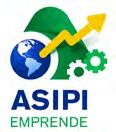
Our ASIPI PRO BONO Program was selected by WIPO to provide legal assistance to indigenous women entrepreneurs from Bolivia and Ecuador. As part of this project, assistance has been extended to two entrepreneurial endeavors.
Events
From June 4th to 6th, the Quito Seminar “The Financial World of Intellectual Property” took place, with the participation of nearly 300 attendees.
ASIPI Webinars

In the first semester of 2023, 16 webinars were conducted, including those organized in collaboration with sister international associations such as FICPI and AIPPI, as a result of the collaboration agreements signed with these institutions in 2022.
1. Digital Marketing - New Paradigms in Communication Strategies
2. Advergaming: Advertising through Games
3. Surveillance of Intellectual Property Rights by Customs Authorities at the U.S. Border
4. The Current Situation of Venezuela’s Patent System and Its Future Vision
5. Piracy as a painful reality for LATAM, its effects on the industry and digital.
Roundtable Discussions
Five roundtable discussions were held, two in the United States, one in Cuba, one in Uruguay, and one regional table in which the four member countries of the Andean Community participated (Bolivia, Colombia, Ecuador, and Peru).
Publications
The following publications have been finalized and are now available to ASIPI members in our Library:
1. ASIPI Writes - Responsibility, Obligations, and Sanctions for Sports Influencers in Costa Rica and Argentina. Sports Law Committee
2. Working Papers: XXIII Work Sessions and Administrative Council in Medellin
3. Interviews 2022
4. MUNDO ASIPI Magazine: Second volume of our MUNDO ASIPI magazine published in January 2023
5. Geographical Indications and Designations of Origin Bulletin. Third Edition. Year 2, 2023.
Working with Universities
ASIPI Podcasts
The following 5 podcast episodes were completed:

We continue to advance our work with universities in the region. The following joint activities were carried out in this first semester: 20
1. Universidad de Especialidades Espíritu Santo (UEES) in Guayaquil, Ecuador: Orange Economy Seminar.
2. Universidad Hemisferios – Ecuador: Border Measures Workshop.
3. Universidad Hemisferios – Ecuador: Women and Intellectual Property Seminar, Accelerating Innovation and Creativity.
4. Universidad Metropolitana de Caracas – Venezuela: New Challenges of Intellectual Property: New Technologies, Business Models, and Exploitation Forms.
Social Work: “One Backpack, One Opportunity” Campaign
The Social Action Committee continued its tireless work through the promotion of the “One Backpack, One Opportunity” campaign, which collected 142 backpacks during the Quito Seminar and donated them to a local school.
Institutional Relationships
A. IP Offices and Authorities
• Supreme Court of Justice of Paraguay: Launch of the Moot Court Competition: Women and Intellectual Property, Accelerating Innovation and Creativity, organized by CSJ and APAPI, with the support of ASIPI

• INDECOPI - National Institute for the Defense of Competition and the Protection of Intellectual Property: Participation as a supporting entity in the XXII National Invention Contest 2023 and the National Comic and Graphic Novel Contest - Second Edition.
• OCPI - Cuban Office of Industrial Property: Participation in the VII Congress on Industrial Property, represented by Jorge Chávarro.
• Andean Community Court of Justice: Joint organization of the forum titled “Judicial Dialogue on Intellectual Property” held on June 3rd as part of the ASIPI seminar in Quito.
• EUIPO: ASIPI’s participation in the following events: “2023 SQAP Audit on Cancellation Decisions,” represented by Patricia Revuelta and Marta Rodriguez. “34th Meeting of the EUIPO User Group” held in Alicante, represented by Eva Toledo and Cristina Hernández-Marti. “EUIPO IP Regional Seminar” held in Vienna, represented by Eva Toledo and Martha Rodríguez.
B. Regional Associations
• ABAPISUL: Participation in the XVIII ABAPISUL Regional Meeting 2023, represented by Martín Pittaluga.
• ASPI: Invitation by the Paulista Association of Intellectual Property to the XXII ASPI International Intellectual Property Congress 2023 in Sao Paulo, represented by Giselle Reuben.
• AMPPI: Participation in the opening ceremony of the 12th International Conference on “Intellectual Property and Cultural Heritage”.
C. International Associations
• FICPI: Institutional presence at the “Developments in IP Law” Seminar in Atlanta, represented by Giselle Reuben.
21
• AIPPI: Series of webinars related to traditional knowledge, genetic resources, and cultural expressions. In collaboration with AIPPI, we also participated in the second edition of their SCAN THE GLOBE to address the intellectual property situation in some countries in Latin America and the Caribbean.


Agreements
Signed: CNRSV El Salvador managed by National Delegates Edna López and Edy Guadalupe / Community Plant Variety Office (CPVO) / Association of Fashion Law Experts (AEDM) from Spain (Fashion Law Committee) / National Chamber of Commerce, Services, and Tourism – CANACO / National Commission for Science and Technology (CONACYT) of Paraguay (ASIPI Pro Bono) / Ibero-American States Organization for Education, Science, and Culture - OEI (ASIPIACADEMIA).
Moot Court on Intellectual Property
On April 10th, the formal launch of the Moot Court on Intellectual Property Law – Third Edition 2023 took place. This event was jointly organized by ASIPI, INTA, and the TJCA. Thirty-six teams have registered, and the final is scheduled for October this year.
Membership
From January to date, 57 new members have joined, and three reinstatements have been recorded. We currently have a total of 1015 members. We continue to grow!
SPACE FOR COMMITTEES, PROGRAMS AND COMMISSIONS

VOiCES
23
ADMINISTRATION OF LAW FIRMS COMMITTEE
Working towards better management and direction of intellectual property law firms
The Administration of Law Firms Committee led the second edition of the webinar on “Trends in Compensation and Benefit Schemes in the Legal Services Market: How to Improve Employee Value Proposition?” This event took place in collaboration with the Colombian consulting firm Human Capital on March 30, 2023. During this insightful forum, we explored several trends and conducted statistical analyses across the following important areas:
(i) Work environments: A significant trend observed is the increasing preference for permanent remote work arrangements.
(ii) Management models: There is a clear inclination towards innovative leadership approaches characterized by agile structures and strategies focused on achieving results.
(iii) Compensation schemes: An optimal approach involves implementing a formula that combines a fixed salary with flexible payment options, variable incentives, benefits, and emotional rewards.
Regarding this last point, according to the salary and human resources management trends survey conducted by Total Rewards for 2023, eight out of nine organizations will focus their efforts on strengthening emotional salary. This is in response to the current reevaluation of labor priorities, where the focus should be on the well-being of workers and their experience within a culture of organizational happiness.
This is demonstrated by the latest statistics, for example, in the Colombian case, when reviewing what potential employees seek in a value proposition, the key elements are (in this order): quality of life, temporal and spatial flexibility, salary, projection and development opportunities, meaningful work, and training.

Our purpose is to provide law firms with tools to achieve improvements in their management, so we invite all members of ASIPI to share with this Committee any issues they would like to see addressed during 2023.


24
ANTI-COUNTERFEITING COMMITTEE
In full swing
TThe projects of the Anti-counterfeiting Committee are moving forward steadily, and together with Arturo I. González and colleagues, we have the great task of completing the digital book on counterfeiting and piracy in Latin America.
The webinars that have been promoted and successfully scheduled by the committee have generated great interest among members and additional audiences. This has been made possible by the dedicated
work of Laura Plavnick, while the podcasts have been impeccably produced by the working group led by Gonzalo Luzuriaga.

In addition, José Alejandro Santana led the work related to ASIPI Writes, and committee members wrote articles on various topics, which are now part of the association’s digital library.

We would like to express our gratitude to all the committee members for their active work.
ENTERTAINMENT COMMITTEE
Webinar on Trends and Legal Challenges in the Adult Entertainment Industry
TThe adult entertainment industry is, on one hand, one of the most dynamic, innovative, and lucrative branches within the entertainment industry. Furthermore, it is worth noting that this industry faces significant challenges in terms of legal, regulatory, and intellectual property matters.
During the first semester of 2023, the Entertainment Law Committee delved into the study of this topic and organized a webinar on the trends and legal challenges in the adult entertainment industry. The webinar featured panelists from Mexico (Eduardo de la Parra), Colombia (Eduardo Varela), and the United States (Marc Randazza), with moderation by committee member Marcela Mancia (El Salvador). The panelists provided a practical perspective on the main challenges faced by this industry in their respective jurisdictions, the key regulations in their countries that impact this branch of entertainment, as well as the interplay and potential conflicts between regulation and fundamental rights at stake.
We would like to express our gratitude to the committee members and the webinar panelists for their contributions to the study of this engaging topic.
25
Metaverse and Privacy: Eight Concerns
TThe Data Protection Committee wishes to share the main concerns related to personal data in the Metaverse. We express our gratitude to Daniela González, Gina Guerrero, and Marco López, committee members, for their contributions to this text.
Metaverse entails the existence of a virtual life for users who choose to be part of this new world. Although this virtual life is built upon the transformation from real human experiences to digital ones, much of this virtual world relies on real personal information from each user, including biometric data and non-verbalized information such as movements, emotions, and behaviors. What does this mean in the context of the regulatory “boom” regarding privacy and data protection?
Here are eight of the most relevant concerns:

1. Scalability: The exponential scalability in data collection and utilization raises concerns about control and accountability over its use.
2. Virtual identity: Virtual life increases the exposure to fraud or identity theft as multiple ways to access the Metaverse (e.g., glasses, mobile, etc.) have few guarantees in safeguarding a unique and non-transferable identity.
3. Immersive interaction: With different virtual spaces or interoperable platforms, the visibility of virtual identity becomes even more extensive.

4. Advanced technologies: Many technologies used in the Metaverse, such as artificial intelligence, blockchain, 5G, Cloud, among others, are in advanced stages of development, leading to an exponential increase in the amount of information processed through these technologies. This makes the Metaverse highly intrusive.
5. Sensitive data: The mechanisms for interacting in the Metaverse rely on the collection and use of sensitive data, such as biometric data. Mechanisms to protect this information beyond non-sensitive personal data are unknown.
6. Profiling and neuromarketing: Technologies in the Metaverse facilitate user profiling and mass surveillance, enabling extensive neuromarketing techniques that can influence user decision-making.
7. Security: It may lead to increased complexity in detecting and addressing security incidents or cyber-attacks, such as hacking avatars and linked accounts, attacks on virtual reality devices, and new forms of “phishing”.
8. Data transfers: The interaction between individuals and entities worldwide poses a challenge in terms of regulations. These aspects are some of the concerns to be reviewed by regulations and normative projects, especially in the European Union, such as the Digital Services Act, the Data Act, the Digital Markets Act, and the Data Governance Act. We will wait to see how these regulations progress and how they are implemented to address the raised concerns.
Sources: https://www.aepd.es/es/prensa-y-comunicacion/blog/metaverso-y-privacidad https://www.hosteltur.com/comunidad/005096_la-ciberseguridad-y-privacidad-en-el-metaverso.html
DATA PROTECTION COMMITTEE
26
FASHION LAW COMMITTEE
Lawyer profession is in vogue
AAs part of the courses offered within the ASIPIACADEMY Program during the first semester of this year, the Fashion Law Committee organized and led the first Fashion Law course, which concluded successfully with the participation of 73 enrolled students. A special thanks to the professors who joined us for this edition and delivered high-level presentations.
Other noteworthy activities of the committee include the signing of a collaboration agreement with the Fashion Law Experts Association, the “Fashion and Gaming” webinar held on June 29th, and we will soon be announcing the release of the fully updated Fashion Law Guide.
INDUSTRIAL DESIGN COMMITTEE
ASIPI Design Awards: Importance and Challenges of Design
UUndoubtedly, the protection of the distinctive appearance of products and its link to a business origin for consumers is of great importance for the commercial development of companies. According to statistical information from WIPO in 2022, the protection of industrial designs increased by 11.2% compared to 2021, reaching 25,028 designs filed worldwide.
Germany remains in the first place with 4,909 designs, followed by China with 2,558, and the main sectors are communication equipment (10.4%), transportation (9.7%), and packaging and containers (7.0%).
The current market demonstrates sectors of the economy where design is decisive and represents a factor of innovation and development. A clear example of this is the technology industry, where products launched into the market not only have novelty and represent solutions but also their appear-
ance seeks to attract consumers so that the purchasing decision is determined by the design.

Due to the importance of designs for the economy and companies, the ASIPI Industrial Designs and Three-Dimensional Trademarks Committee has created the ASIPI DESIGN Industrial Designs Competition with the purpose of increasing awareness regarding the system of protection for industrial designs and promoting it as a valuable intellectual property right that underpins the economy and employment.
This year, ASIPI will award recognition to the best industrial designs from participating countries at its annual event in Mexico City, and the competition is supported by the Mexican Academy of Creativity and the Colombian Association - Academic Network of Design (RAD).
We thank our members Maria José Lamus and Monica Bonnet for preparing this note.

27
LEGISLATION COMMITTEE
Collaborative Work

TThe Legislation Committee, in February of this year, held a joint webinar with the Data Protection Committee addressing the topic “Regulatory Trends in Privacy Matters.” The invited panelists were Pablo Palazzi from Argentina, María Maqueo from Mexico, and Daniela González from Colombia.
During the webinar, they discussed, among other things, the origin and evolution of privacy and data protection regulations, the similarities or
differences of their norms compared to the European General Data Protection Regulation (GDPR), and how enforcement has evolved in their respective countries.
Currently, the committee is working on a questionnaire on the topic of Data Protection. The aim of the questionnaire is to gather information summarizing the regulations in each country, in order to leverage previous experiences and share them with those who are not yet familiar with the topic or with countries where the issue is still in the planning or near future stages.
ASIPIEMPRENDE PROGRAM
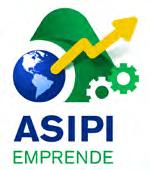
Empowering Entrepreneurs
EIn the year 2023, through the ASIPIEMPRENDE program, we continue working to promote and spread awareness of the importance of intellectual property for entrepreneurs in our region. To date, two virtual events have been held, focusing on general aspects of trademarks and the importance of their protection as a vital asset in entrepreneurship.
One event was held in collaboration with the Junior Chamber International (JCI) of Bolivia, and the other with the Center for Innovation and Entrepreneurial Development at the Catholic University of Peru (CIDE PUCP). The participants of the program, Martha Landivar (Bolivia), Lisandro Coll Areco (Argentina), Alejandro Castro (Peru), Isabel Manrique (Venezuela), and María del Pilar Troncoso (Dominican Republic), actively took part in these events.
The topic generated great interest among the participants, who had the opportunity to learn about different types of trademarks, their protection, and proper defense. They also had the chance to clarify concepts and receive answers to their various inquiries on the subject.
Furthermore, during the ASIPI Seminar held in Quito, intellectual property training sessions were conducted at the Quito Chamber of Commerce and at EDES Business School. Morena Zavaleta (El Salvador), Ileana Martinelli (Panama), and María del Pilar Troncoso provided these training sessions, followed by personal clinics with entrepreneurs organized by Raquel Toñánez and Margarita Zambrano from the ASIPIPROBONO program.
The event welcomed entrepreneurs who were interested in acquiring basic knowledge of intellectual property and receiving personalized advice for the protection of their ventures.
ASIPIEMPRENDE will continue working for and with entrepreneurs in the region throughout the year. This includes conducting various workshops and training sessions, signing collaboration agreements, producing and disseminating interviews with entrepreneurs, and creating editorial pieces that provide insights into the importance of intellectual property for innovators.
28
PROBONO PROGRAM

Supporting Society
DDuring the first 5 months of the current year, the program has received 12 requests for PROBONO services, resulting in a total of 25 active cases being handled thanks to the collaboration of our program affiliates, which currently consist of 147 members. Through this program, legal advice on IP matters is also being provided to the WIPO Program on Intellectual Property Training, Mentoring, and Networking for Indigenous Peoples and Local Communities in Bolivia, Colombia, Ecuador, and Peru. We have already received 2 requests from this program, which are currently being processed.
We are also pleased to announce the signing of a Cooperation Agreement with the National Commission for Science and Technology (CONACYT) of Paraguay, for training in IP matters and PROBONO services for their researchers.

Finally, as part of the ASIPI seminar in Quito, in collaboration with the ASIPI EMPRENDE program, a Training Workshop on IP topics and PROBONO Clinics was held on Friday, June 2nd. In the morning, the training took place at the Quito Chamber of Commerce, and in the afternoon, it was held at the EDES UTPL Business School.

29
in the region

30
Bolivia

Women Driving Innovation and Creativity: The Significance of World Intellectual Property Day 2023
By: Shirley López Espinoza and Ximena Zapata Tapia
During the activities of World Intellectual Property Day in Bolivia, various events organized by different private institutions highlighted this year’s theme: Women and Intellectual Property. It was evident that despite the challenges women face in terms of gender gaps in education and access to financing, innovative women are making significant contributions in various fields.
The showcased activities revealed that more and more women are daring to innovate. Several projects conceived and led exclusively by women were highlighted, ranging from technological startups to creative innovation projects in traditional Bolivian cuisine.

These activities underscored the importance of protecting patents, trademarks, and copyrights, as this protection is vital for these entrepreneurial women to ensure recognition and appreciation of their creations in the market, thus generating economic benefits and increasing their visibility.
In essence, this year’s theme and its outcomes invite us to work in an environment of continuous support, establish more training programs targeted at women, and foster the idea that their innovative and creative projects play a crucial role in the country’s economic growth.
31
Brazil

Changes in INPI, National Intellectual Property Strategy, and New Geographical Indication
By: Andrea Possinhas
The year 2023 has brought several changes and events during the first semester. Here’s a summary of the highlights.
• INPI leaves the Ministry of Economy: With the new president of Brazil taking office, the National Institute of Industrial Property (INPI) is now under the Ministry of Development, Industry, Trade, and Services (MDIC). The Vice President of the Republic has appointed Júlio César Castelo Branco Reis Moreira, who has served as the director of patents at INPI for 7 years, as the interim president of the Institute. Provisional directors for Trademarks and Patents have also been appointed.
• Financial Autonomy of INPI: The issue has been widely debated and advocated by national intellectual property associations. The financial autonomy of INPI is crucial to address the backlog issue in trademark and patent examination, as well as to enable investments in technology, hiring, and continuous improvement of its services.
• National Intellectual Property Strategy (ENPI): The Technical Group, created within the framework of the Interministerial Group on Intellectual Property (GIPI), has concluded a Final Report to contribute to the National Intellectual Property Strategy (ENPI), which aims to establish governance and coordination for initiatives, projects, and programs related to intellectual property in Brazil. Proposed normative and administrative changes were evaluated. Discussions included strengthening the budget of INPI,
spreading knowledge about IP, and promoting the use of patent protection, among other topics.
• INPI Action Plan 2023: Among the main implementations, the action plan includes the modernization of IP registration processes, strengthening international cooperation, promoting innovation, and incentivizing industrial property protection in the country. INPI aims to drive the creative economy and ensure an environment that fosters innovation and technological development in Brazil.
• Updated Patent Landscape in Brazil: In the field of patents, the implementation of collaborative examination through the backlog attack plan aims to substantially reduce the number of pending patent applications, along with the creation of various priority procedures. Discussions regarding the legitimacy of Article 32 of the Industrial Property Law, among other measures, are considered efforts to make Brazil increasingly competitive economically and internationally relevant and interesting.
• First Geographical Indication granted for Brazilian sparkling wines: Located in Altos de Pinto Bandeira in the south of the country, the GI has a status equivalent to Champagne from France, Cava from Spain, and Franciacorta from Italy. The Geographical Indication was applied for in 2012.
32
Cuba

Roundtable: “Challenges of Intellectual Property in the International Sphere and in Cuba”
On April 11th, a roundtable was held in person, convened by the Cuban delegation of ASIPI , on the topic “Challenges of Intellectual Property in the International Sphere and in Cuba” to commemorate World Intellectual Property Day. The keynote speaker was Dr. Liudmila Morán Martinez, a professor at the University of Havana.
The presentation focused on the new challenges facing Industrial Property at both the international and national levels. In this regard, it is vital for lawyers specialized in this field to be aware of the international negotiations taking place in recent years within the World Intellectual Property Organization (WIPO), which have significant implications for the policies and legislations adopted in developing countries, particularly for Cuba.
For example, within the Standing Committee on Trademarks, Industrial Designs, and Geographical Indications, the simplification of procedures for the
protection of industrial designs has been underway since 2006, leading to the proposal of a treaty on Design Law (DLT). The aim of this treaty is to help designers obtain protection for their designs in a simpler manner. If this new treaty is adopted, Cuba should assess the advantages and disadvantages of its possible accession and the benefits it could bring to the national handicraft industry and other sectors.
Another aspect discussed during the roundtable focused on negotiations regarding an international legal instrument concerning intellectual property, genetic resources, and related traditional knowledge.
Lastly, the importance of Micro, Small, and Medium Enterprises (MSMEs) in Cuba and how to contribute to their development of appropriate intellectual property strategies was addressed. Raising awareness about how to protect and manage their intellectual property assets is a complex issue, especially in the Cuban market.

33
UNITED STATES

Copyright Registration Guide: Works Containing Material Generated by Artificial Intelligence


The U.S. Copyright Office recently published the “Copyright Registration Guide: Works Containing Material Generated by Artificial Intelligence.”
Under U.S. copyright laws, “the term ‘author,’ as used both in the Constitution and the Copyright Act, excludes non-human entities.” The new guidance states that “In the case of works containing material generated by AI, the Office will consider whether the AI contributions are the result of ‘mechanical reproduction’ as opposed to the ‘original intellectual conception’ of a human author to which [the author] has given visible form.” The determination will depend on the circumstances, particularly how the AI tool functions and how it was used to create the final work. If the traditional elements of authorship in a work were produced by a machine, the work lacks human authorship, and the Office will not register it.
Roundtable: Evidence for Use in a Foreign Proceeding
On March 29th, a roundtable was held to discuss the statute 28 U.S.C. § 1782, which allows a litigant in a foreign action to request the submission of evidence from a person or entity residing or located in the United States for the purpose of obtaining documents or deposition testimony for use in a foreign proceeding. During the roundtable, the panelists addressed the requirements for a Section 1782 proceeding and the development of this legislation over the years.

34
Honduras
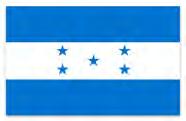
Celebrating World Intellectual Property Day

On the occasion of World Intellectual Property Day, various events were held in collaboration with local organizations. The first event was organized with the Conciliation and Arbitration Center of the Chamber of Commerce and Industries of Cortés, where an analysis was conducted regarding the use of different alternative dispute resolution methods to resolve conflicts related to Intellectual Property. We had the special participation of our Dominican partner, Mary Fernández, former Chair of the Mediation, Conciliation, and Arbitration Committee of ASIPI
The second event was held with the Honduran Association for Intellectual Property (AHPPI), focusing on geographical indications as the main theme.
Paraguay

Launch of the Second Edition of the Intellectual Property Moot Court
On April 21, the launch of the Second Edition of the Intellectual Property Moot Court took place in Paraguay. This competition is organized by the Directorate of Intellectual Rights of the Supreme Court of Justice and the Paraguayan Association of Intellectual Property (APAPI), with the support of ASIPI
Celebrating World Intellectual Property Day
ASIPI, through the National Delegates of Paraguay, was present at the Commemorative Event of World Intellectual Property Day held on Wednesday, April 26, organized by the National Directorate of Intellectual Property (DINAPI).
On the same day, an event was held in collaboration with APAPI and the Paraguayan Group of AIPPI as part of the same celebration. In line with WIPO’s theme, “Women and IP,” four outstanding women inventors, creators, and entrepreneurs from Paraguay were invited. They were Lara Hutemann, founder of Periferia Comunicación, Alex Vuyk, Level II researcher at PRONII, the National Program for Incentive to Researchers of CONACYT, Luciana Abente, entrepreneur and founder of Artemera, and Mónica Gonzalez, visual artist.

36
Venezuela
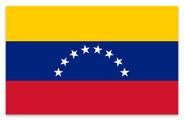
On April 25, as part of the celebration of World Intellectual Property Day, an event titled “New Challenges of Intellectual Property: New Technologies, Business Models, and Forms of Exploitation” took place in Caracas, Venezuela. This event was organized by the Venezuelan College of Industrial Property Agents (COVAPI), with the support of Universidad Metropolitana and the Inter-American Association of Intellectual Property (ASIPI), in memory of the 10th anniversary of the passing of Dr. Ricardo Antequera Parilli.
Our delegates in Venezuela, Enrique Cheang and Isabel Manrique, as well as our Vice President, Luis Alejandro Henriquez, were present and actively participated in the event. The panel of the event comprised eminent professionals specializing in intellectual property (IP) and related fields. They engaged in discussions covering a wide range of topics, including the economic impact of IP on countries, the societal and economic consequences of combating counterfeiting, the video game industry and the metaverse, and the rights associated with art. Additionally, they highlighted the GEGO Foundation as an exemplary model for the management of artistic legacies.

During the event, recognition was given to two remarkable Venezuelan women, Irene De Sola and Thaimy Márquez, for their valuable contributions to the world of IP throughout their careers, both in Venezuela and worldwide. Finally, our partner Rafael Ortín delivered a heartfelt and beautiful speech in memory of Dr. Antequera Parilli, a great friend and collaborator of ASIPI.

37
THE BILLBOARD CLUBS


GASTRONOMY CLUB

We would like to highlight the talk “Specialty Coffee from Guatire: Ávila Blue” given by René Orellana founder of @quiero1cafe, who enlightened us with this Venezuelan venture that they define as “to make you proud of the flavors and aromas of Venezuela”. It is a coffee with over 80 points in the physical examination of the bean, as well as in the sensory tasting by the international baristas from the Specialty Coffee Association (SCA). The coffee received a rating of 88.53, bringing it close to the 90 points required to be classified as an exquisite coffee. Undoubtedly, the brand owner, Eduardo Aristigueta, has every reason to be proud of this recognition, which places the price of this coffee at US$300 per kilo. Special thanks to our Venezuelan partner, Carolina González, for her collaboration in making this activity possible.
On the other hand, Mrs. Sonia de Guinard, the mother of our Panamanian member Luis Guinard, gave us a talk from her home kitchen on “How to prepare the best Ron Ponche”. It is a typical Panamanian alcoholic beverage, sweet and dense, enjoyed after meals and particularly during Christmas and New Year celebrations. It was quite an experience, from the list of ingredients with the traditional evaporated and condensed milks to the manual beating of eggs, which are then added to the milk mixture, not forgetting the special touches of vanilla and nutmeg, and of course, the white rum. For a more “festive” touch, cognac or brandy can be added to taste.
A delightful treat!

38
MOVIES & SERIES CLUB
We decided that history would be the spotlight during 2023. The group’s proposal was unanimous: to learn and know more about the events that have marked humanity in a fun and entertaining way, through series and movies. As in previous years, the idea is to meet once a month among friends and discuss the chosen film, the political situation, the context, the characters, etc. It’s a kind of film forum where all the attendees participate and share their experiences and takeaways.
Our first film was “RESISTANCE” (2020). Set in Nazi Europe, it narrates the early career of the great mime Marcel Marceau and how, with his art, he helped protect the lives of several Jewish orphaned children by joining the French Resistance

“7 DAYS IN ENTEBBE” (2018), with an incredible soundtrack, narrates the titanic rescue mission of 248 hostages by the Israel Defense Forces (IDF), based on information provided by the Mossad (Israeli Intelligence Agency), who were kidnapped by Palestinian and German terrorists.
Our last gathering featured a guest, Juliana Canal, General Producer at Mila Films Colombia, who spoke to us about “The world of Content Production”. With her art and experience, she showed us different ways to attract consumers or general audience through digital platforms, creating friendly, different, and entertaining content that generates what matters most, remembrance. A whole experience in an almost magical world for us lawyers who don’t use these types of tools much to expand our firms.
We
39
invite you to join the club and enjoy the seventh art with us!
THE ACADEMY
The Academy had a successful first semester in 2023. Below, we provide details of the activities carried out, as well as the upcoming courses scheduled for both the second semester of 2023 and the first semester of 2024. Many thanks to the entire Council, coordinators, speakers and students who contribute to the continuous growth and consolidation of the Academy.

40
In the first semester of 2023, ASIPIACADEMY successfully conducted the following courses:
• Course on “Trademark Law in the Digital Environment”, organized for the School of Judicial Studies of Guatemala. The following speakers participated in the course: Marco Palacios (Guatemala), Hugo

Gómez (Peru), Gustavo García Britos (Bolivia), Estela de Luca (Argentina), Luis Baz (Spain) and María José Lamus (Colombia). Over 160 magistrates attended.
• Course on “Fashion Law”, organized by the Fashion Law Committee. The course consisted of 7 modules and achieved a record-breaking participation of 73 registered attendees. The speakers were: Sussy Bello Knoll (Argentina), Annalucia Fasson (Peru), Pamela Echeverría (Argentina), Beatriz Ayala (Venezuela), Begoña Cancino (Mexico), Daniela Moreira (Ecuador), Marlena Jankowska (Poland), Olivera Medenica (United States), Enrique Ortega Burgos (Spain), Christian Videl (Chile), Carolina Albanese (Argentina), Mariana Santos (Spain), Karina Calderón (Guatemala) and José Roberto Herrera (Colombia).

41
• Furthermore, within the framework of the ASIPI Seminar in Quito, THE ACADEMY organized the forum “Ibero-American Jurisprudential Dialogue on Intellectual Property”, in collaboration with the Court of Justice of the Andean Community. The speakers were magistrates Gustavo García Brito (Bolivia), Edgardo Ettlin (Uruguay), Ramiro Bustamante Zegarra (Peru), Luis Antonio Soler Pascual (Spain), Hugo Gómez Apac (Peru), Iñigo Salvador Crespo (Ecuador). There were over 120 registered participants.
For the second semester or academic year 2023-2, the following courses are planned to be launched:
1) “Jurisprudential Advances in Patents, Utility Models and Industrial Designs”, organized by the Harmonization and Advancement of Jurisprudence Committee; Patents Committee; and Industrial Designs and Trade Dress Committee;
• Course on “Legal Aspects of the Audiovisual Industry”, organized by the Copyright Law Committee. The course had 10 modules and a participation of 72 attendees. The speakers were: Nicolás Celis (Mexico), Carolina Romero (Colombia), Inés de Casas (Spain), Eduardo Varela (Colombia), Mabel Klimt (Spain), Patricia Rengifo (Colombia), Christopher Jardon (Mexico), Alfredo Corral (Ecuador), Federico Duret (Spain), Fernando Epstein (Uruguay), Rafael Ortin (Venezuela) and Virginia Servent (Guatemala).

2) “Digital Marketing”, organized jointly with AIB Colombia and led by the Administration of Law Firms Committee.

On the other hand, a collaboration agreement was signed between the Organization of American States for Education, Science and Culture (OEI) and ASIPI, in the fields related to promoting Digital Culture and Intellectual Property actions in Ibero-America, through the Ibero-American Chair of Digital Culture and Intellectual Property (University of Alicante-OEI), with the aim of jointly promoting initiatives and actions related to the protection of the Intellectual Property of creators and artists in Ibero-America, particularly in digital environments.
Finally, for the first academic year 2024-1, we are working on two proposals:
1) “Jurisprudential Advances in Copyright Law” and
2) “Geographical Indications and Appellations of Origin.
42
We invite you to participate in the upcoming courses and stay tuned for new activities

43


ALL ABOUT YOUR HEALTH Interview with Carina Rodríguez* Mexican nutritionist, expert in conscious nutrition. This interview is a transcription of the first part of a podcast conducted for ASIPI * Healthy Eating Habits Where do I begin? 44
1. Let’s start with something basic. What can be considered a healthy diet?
First and foremost, I want to clarify that eating healthily does not mean restriction, prohibition, or calorie counting. Eating healthily is a worthwhile endeavor that can be seen as a long-term investment. To begin understanding this, we must know that there are three major food groups: i) fruits and vegetables, which provide us with fiber and vitamins; ii) proteins, which include animal products, seeds, and legumes; and iii) grains, which are the primary source of energy and the first thing the body utilizes for functioning. A healthy diet should include these three major food groups in breakfast, snacks, and dinner, in sufficient quantities to feel satisfied, and with a focus on variety, meaning not always repeating the same fruits/vegetables, proteins, and grains.
2. But should we always be mindful of the level of fats and sugars present in these groups?
Yes, we should be cautious about fats and sugars, but more important than that is the quality, quantity, and frequency of their consumption. No food should be prohibited, but at the same time, everything can be poison, so we need to achieve a balance without restriction, as I mentioned earlier. Ultimately, we shouldn’t stop eating; rather, we need to know how to eat.
3. Alright. It sounds easy, but certainly it’s not. For example, frequency and quantity are things we can regulate, but

how can we determine the quality of food within each of these groups?
There’s a lot of common sense involved in food selection. Fruits and vegetables should be natural and not canned or pickled. We should eat them in bites or chopped, not in juices, as that leads to a loss of fiber and vitamins. In terms of proteins, quality lies in vegetarian sources like legumes, beans, chickpeas, lentils, and natural proteins such as white meats. As for grains, those that appear more natural, without packaging or labels, tend to be higher in fiber, while lower-quality grains often contain more sugars.
4. Going back to the food groups, is there one that is more important than the others?
All three groups are equally important. They all contain fats, carbohydrates, and proteins to varying degrees. Fats generate hormones and provide maintenance to the central nervous system. Proteins are responsible for generating all the body’s tissues and cells, and carbohydrates are the primary source of energy.
5. So, where does the notion that carbohydrates are bad fit in?
It’s true that historically we’ve been taught that carbohydrates are the enemy. However, if we reduce or eliminate carbohydrates based on the energy needs of our bodies, for our vital functions, we will limit muscle generation or even lose muscle mass. We
… There’s a lot of common sense involved in food selection…
… we shouldn’t stop eating; rather, we need to know how to eat…
45
can’t allow this because muscle is the most important tissue we have—it burns calories, converts what we eat into energy, and prevents it from being stored as fat. So, again, when consuming carbohydrates, we shouldn’t limit quantities but rather choose quality.
6. Will there be a person who wants to lose weight, another who simply wants to eat healthy, and another who wants to improve athletic per formance? I deduce that each one will have a different (healthy) meal plan, is that correct? Absolutely, a meal plan is like a tailored suit. We have to include different food groups in varying quantities depending on each individual, their activi ties, their goals, and so on. But we always include the three mentioned groups. And here I take the opportunity to say that we refer to a meal plan rather than a diet be cause the term “diet” is general and not necessarily positive. It
can be either a good diet or a bad diet, considering that a diet is
Since you mentioned “diet,” there is a phrase often heard when it comes to weight loss that says, “Eat breakfast like a king, lunch like a prince, and dinner like a beg-
Science is constantly evolving. At some point, it was said that all meals were equally important, but lately, scientific evidence suggests that this may be true at a hormonal level. Currently, the circadian rhythm is in vogue, which suggests that one should be awake in the morning and fast and rest at night. So, possibly in the mornings, the body may be slightly more hormone-efficient. However, this “rule” is not a guarantee of anything, and therefore, as we mentioned earlier, the ideal approach is always to develop a suitable and personalized meal plan for each individual and closely monitor the results.
How true is that?…
This interview will continue in the next issue…


( ) 46
TO REMEMBER IS TO LIVE AGAIN
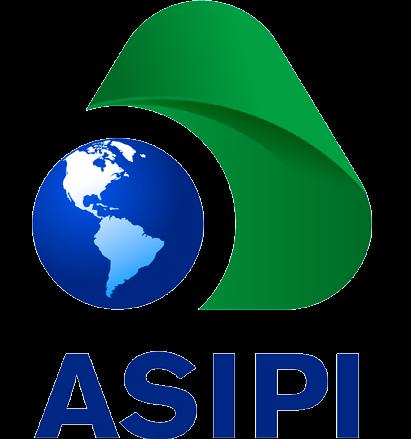
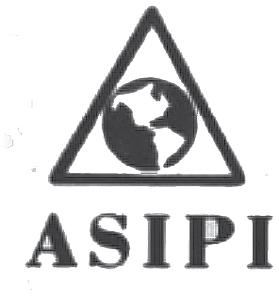
47

48
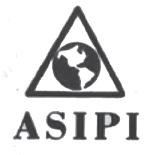

III ASIPI Congress, May 18th to 21st, 1971, Caracas, Venezuela 49


III ASIPI Congress, May 18th to 21st, 1971, Caracas, Venezuela 50


IV
51
ASIPI Congress in Santiago de Chile, November 11th to 15th, 1974


V ASIPI Congress, May 22nd to 27th, 1977, Rio de Janeiro, Brazil 52


X ASIPI Congress, November 7th to 11th, 1988, Buenos Aires, Argentina
53
Board of Directors Meeting, December 6th to 9th, 1990, Punta del Este, Uruguay
The European doctrine of clarified act has acceptance in the Andean Community
The Andean Court of Justice has accepted the application of the doctrine of clarified act in the Andean Community. This concept establishes that when a legal act is ambiguous or unclear in its wording, it should be interpreted based on how it has been previously interpreted and applied by competent authorities or customary practice. This doctrine generates legal certainty, normative stability, and judicial efficiency.
Here are some excerpts from the ruling:
RES JUDICATA
54
Source https://www.comunidadandina.org/DocOficialesFiles/ Procesos/391_IP_2022.pdf
Date March 13, 2023
Judge Hugo R. Gómez Apac
Origin Andean Court of Justice
Thesis 1 Prejudicial interpretation (PI) exists to guarantee the coherent and uniform application of community rules in the Member Countries of the Andean Community. Traditionally, it was mandatory to request PI in all cases, without exception, and the response only applied to the specific case under consultation. With this decision, the Andean Court of Justice (ACJ) modified its position and determined that, from now on, when the national judge of sole or first instance must resolve a dispute or apply the Andean Community legal system, they will not be obliged to submit a prejudicial consultation if the ACJ has already issued a pronouncement on the concerned norm.

Thesis 2 However, the obligation to submit the consultation remains when the ACJ has not issued a previous interpretation regarding the specific norm or when, despite a previous interpretation existing, the national judge has questions about specific hypothetical situations that arise
from or relate to the Andean norm, or when they require the Court to specify, expand, or modify its criterion.
Thesis 3 The interpretation of the ACJ is based on the interpretative doctrine of clarified act developed by the Court of Justice of the European Union, according to which the prejudicial consultation lacks cause and content when the question raised is identical to one that has already been the subject of a prejudicial decision.
Thesis 4 Additionally, the ACJ took into account, in issuing its decision, the jurisprudence of the same Court, which allowed it to vary or even change its opinion on the mandatory submission of the preliminary consultation when justified reasons existed.
Subject Prejudicial interpretation.
LIBRARY
During the first semester of 2023 ASIPI, with the collaboration of its members, has made the following publications that can be found in our library:
www.asipi.org/biblioteca/en

56



57
SO IT WAS IN QUITO ASIPI’s energy reaches the Middle of the World
58
From June 4 to 6, around 300 attendees gathered at the JW Marriott Hotel in Quito to explore the intersections between intellectual property and the financial world, addressing topics such as the valuation of intangibles, the financing of projects based on intellectual property, the impact of artificial intelligence on IP and its monetization, among many others.
Our Seminar entitled “The Financial World of Intellectual Property” stood out for the topicality and practicality of the topics discussed, the high level of the speakers, the social activities that were framed by the hospitality and warmth of the Ecuadorians, thus ensuring that ASIPI Quito remained in the memory and in the hearts of all.

59
previous days
As is customary in our events, prior to its formal inauguration, ASIPI’s Board of Directors held important meetings. For two days, the members of the Executive Committee met to present their respective management reports, discuss pending issues and make decisions on the functioning of the Association.


60
On Friday, the ASIPIPROBONO Commission and the ASIPIEMPRENDE Program carried out two training activities for entrepreneurs as well as pro-bono clinics together with the Quito Chamber of Commerce and the EDES Business School with the participation of Raquel Toñánez, Margarita Zambrano, María Camila Flórez, María del Pilar Troncoso and Morena Zavaleta. Ecuadorian members Daniela Moreira, Daniela Roman and María José Peñaherrera also collaborated with the clinics.



61
ASIPI Past Presidents present at the event, Martín Michaus, María del Pilar Troncoso, Juan Vanrell and Elisabeth Siemsen, also had their space to meet and talk about the future of the Association, and then had lunch with the members of the Executive Committee.


62
That same Saturday, along with the Court of Justice of the Andean Community, we organized the Forum “Ibero-American Jurisprudential Dialogue on Intellectual Property” to share the content of the most relevant rulings on trademarks, patents and copyright that have recently been handed down in Ibero-America and the European Union.

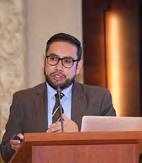

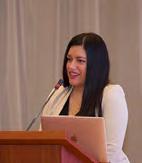

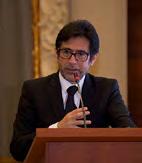
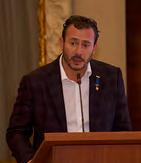

63
In the afternoon, the ASIPI Wine Club organized a wine tasting and pair ing at the Club Sociedad Union Quito. It was a gathering of friends, with wines from the Old and New Continent.



64
Sunday, June 4
Lots of activities took place on Sunday 4, beginning with the meeting of the Administrative Council in which the Executive Committee informed the National Delegates about the status of the projects and programs underway and they, in turn, commented on developments in their respective countries regarding IP. A heartfelt tribute was paid to members Carlos Terra of Venezuela and Elizabeth Flores of Guatemala, who passed away in recent months. ASIPI’s Past Presidents, leaders of the Working Committees/Programs and Commissions, as well as other members participated in this meeting.
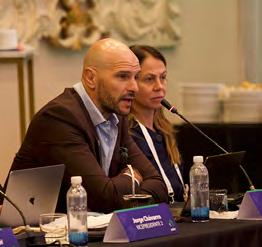




65
After the lunch offered to the participants of the Administrative Council meeting, the 25 Working Committees, the 2 Programs and the 5 Special Commissions held a meeting. For almost two
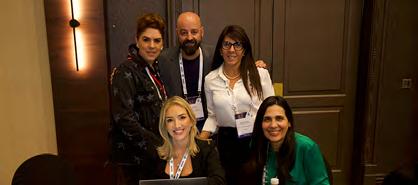

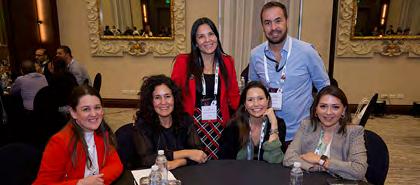
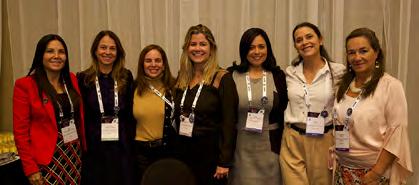
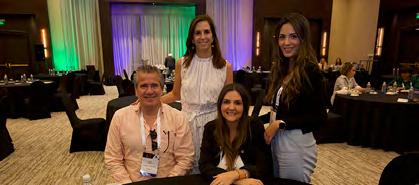
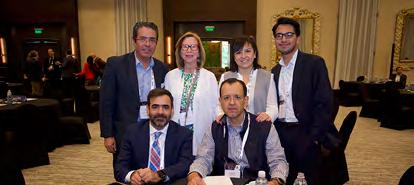
hours, these groups, which we call the “driving force of ASIPI”, shared, exchanged and laid the foundations for the successful completion of the work plan entrusted at the beginning of this administration.

66
At the same time, a meeting with the members of the ASIPIACADEMIA Council and the coordinators of the courses that will be offered during this second semester of 2023 was held. Experiences of previously taught courses were shared to better adapt them to the expectations of the participants.



67
The last meeting of the day was the Mentoring Program in which, under the organization of the Social Action Committee, first time attendees to our events as well as new members, met with members of the Association who served as mentors. In an atmosphere of relaxation and camaraderie, ASIPI President Enrique Diaz gave a warm welcome to the “ASIPI family” and invited them to get involved with all of the Association’s programs and activities. This space was also used to hand out certificates to new ASIPI members.

68
To close the day, a pleasant inauguration cocktail was offered in the gardens and main cloister of the emblematic San Francisco Convent with a typical Ecuadorian dance show.



69
Monday, June 5


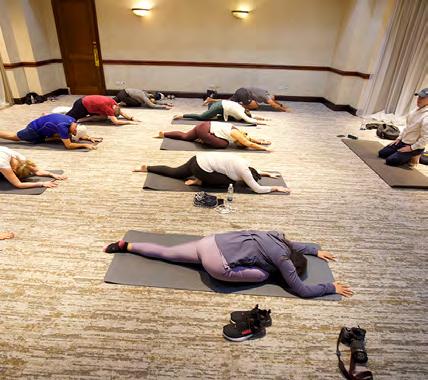

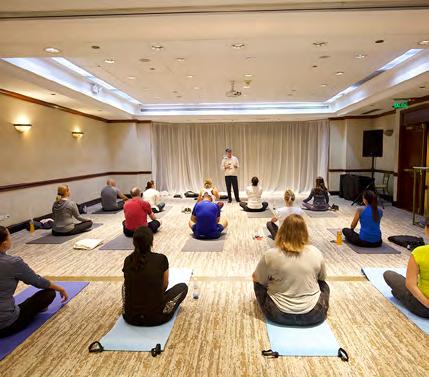
70
Monday, June 5, started with the practice of a kundalini yoga class organized by ASIPIFIT with instructor Francisco Perez
Afterwards, the opening ceremony of the Seminar took place with the words of Cecilia Falconi, President of the Host Committee of the event, who gave a warm welcome to her country. Enrique

Diaz, President of ASIPI, presented a detailed report on the last few months of work in which the Association has made incursions and promoted major projects and participated in various international forums.


71
Monday, June 5 / Academic day
The academic day began with the panel “Demystifying IP Finance” in which a tour was made on how the financial and business sectors visualize these intangibles, how they are approached from the perspective of international taxation and inter-company relations. Allison Mages, Head of the Intellectual Property Commercialization Section of
the World Intellectual Property Organization (WIPO) (Switzerland), Santiago Rojas, Northern Regional Manager and Representative of CAF- Development Bank of Latin America in Peru (Peru), Sergio Gutiérrez Muralles, General Director of Corporate Financial Services (Guatemala), and Enrique Díaz, President ASIPI (Mexico), was the moderator of the panel.

The topic “Brand Valuation: Which methodology is the best?” was led by Flavio Arosemena, President of Arosemena Burbano & Asociados (Ecuador), Ricardo Martínez Ros, General Director of Smart Value (Mexico) and Nuria Marcos Herrezuelo, General Director of Pons IP (Spain) as panelists under the moderation of Yolianna Arosemena, Partner/Regional Director of Intellectual Property of Central Law (Panama). This panel discussed the most used methodologies, what they measure, which one they would recommend according to the segment and the reasons for valuing brands.

72
The last panel of the morning was entitled “Negotiating with Influencers” in which the panelists talked about their experiences and recommendations in the hiring of influencers and of these with a potential client, aspects of due diligence, negotiation of remuneration, among others. This panel included the participation of José Antonio Arochi, Associate of Arochi & Lindner (Mexico), Allison Rothman, Founding Partner of Rothman IP (United States) and Jennifer Malloy, Consultant Venable LLP (United States).



Monday afternoon’s academic session began with the topic “Big Brother is watching: IP and International Taxation”. Geovanna Cerda Mosquera, Senior Manager of GPA Consultores (Ecuador), Marcelo García Sellart, IP. Associate Consultant at Gordó Llobell (Argentina), Claudio Hernández, Partner at Palacios y Asociados -TPS (Guatemala) and Luis Kudo, Managing Partner of Kudo y Niño de Rivera Abogados, S.C. (Mexico) as moderator, presented the BEPS project (OECD) and its lines of action.
Carlos Bosch, Head Legal Counsel at Bia Foods Investments, Inc. (Guatemala), Justin Schwartz, Managing Partner at Impaqto Capital (Ecuador), John Orcutt, Professor of Law at the University of New Hampshire Franklin Pierce School of Law (United States) and moderator Rosane Tavares, Partner at Kasznar Leon -
ardos Propriedade Intelectual (Brazil), participated in the panel on “The IP Lawyer in Acquisitions and Mergers” . Relevant aspects to be considered in the role of the IP lawyer as advisor in the processes of acquisition or merger of IP intensive companies were addressed.


74
Aware of the importance of IP education from an early age, the ASIPIEDUCA Program offered a talk at the educational institution “Liceo Internacional” in Quito with 80 children between 10 and 12 years old. Jacqueline Moreau, President of the Program, Leonardo Cordeiro and Johana Aguirre, members of the Program, participated in this activity.



75
Adiscussion on alternative dispute resolution methods was also held between ASIPI’s Mediation, Conciliation and Arbitration Committee and various centers and professionals from Quito. Present at this meeting were Sujey Torres, SENADI Director; Pablo Solines, President of AEPI; Carmen Robayo, AEPI Mediation Center; Francisco González, CAM Director of the Quito Chamber of Commerce; Patricia Vera, Director of the Ecuadorian American Chamber; Paul Corral, Director of the Chamber of Industries and Adrián Molleturo, Director of Cuenca Chambers; Estuardo Jáuregui and Juan Felipe Porta, President and Secretary of ASIPI’s Mediation, Conciliation and Arbitration Committee, respectively.
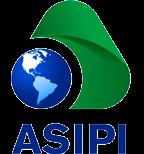

76
After an extensive academic day, the Local Law Firms offered a “Popular Ecuadorian Party” with typical food and dances, fireworks show and all the best of Ecuadorian culture.


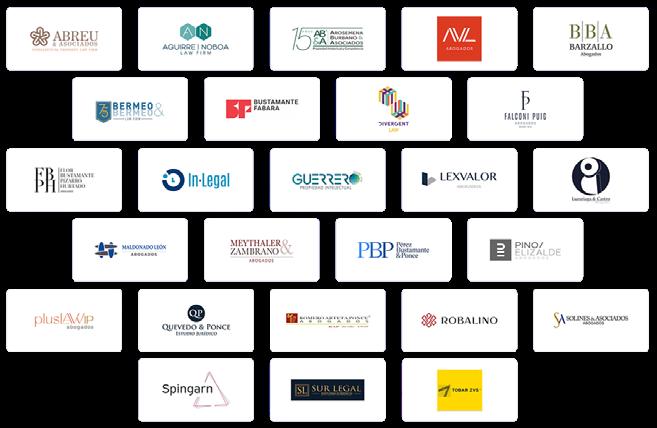
77
Tuesday, June 6
Participants got off to an energetic start on Tuesday 6th with the training class organized by ASIPIFIT

78
Tuesday, June 6 / Academic day
The first panel of the morning was “IP as a facilitator of Banking Credit” with Julio Laso, Vice President Legal & Compliance of Banco Pichincha (Ecuador), Gabriela Contreras, Regional Corporate Manager of the Legal Area at Luminova Pharma Group (Guatemala), Allison Mages, Head of the Intellectual Property Commercialization Section of the World Intellectual Property Organization - WIPO- (Switzerland) and Gonzalo Luzuriaga, General Manager of Luzuriaga & Castro Abogados (Ecuador) as moderator.

The topic on the “Impact of AI on IP and its monetization” was given by Matt Finkelstein, Partner at ArentFox Schiff (United States), Ryan Vacca, Professor of Law at the University of New Hampshire Franklin Pierce School of Law (United States) under the moderation of Marco Antonio Palacios, ASIPI Director 1 (Guatemala). This conference dealt with the role and proper scope of IP law in relation to AI systems and their generated works.

79
Matt Finkelstein, Partner at ArentFox Schiff (United States), Palisa Kelley, Head of Legal and Business Affairs at HarbourView Equity (United States) and moderator Federico Fischer, Associate at Fischer Abogados (Uruguay) discussed the sale of music


catalogs and the reasons for this particular interest as well as the effect of streaming on authors and performers and the trends in this type of “music-financial” operations.
The panel entitled “Transactions Involving Intellectual Property - How are they evaluated by the competition authorities?” included presentations by Mauricio Velandia, Counsel of Falconi Puig Abogados (Colombia), Carlos Esguerra, Founding Partner of Bermúdez y Esguerra (Colombia) and moderator María Rosa Fabara, Managing Partner of Bustamante Fabara (Ecuador).
80
To close the academic day of the Seminar, Marc Gericó, Managing Partner of Gericó Associates Legal Marketing S.L. (Spain), Fernando Peláez Pier, CEO of LexLatin (United States) with Juan Guillermo Moure, Partner of OlarteMoure (Colombia) as moderator, participated in the panel “How much is a Law Firm worth?” and presented practical experiences in the valuation of legal practices and the aspects that are specially considered to arrive at concrete numbers and proposals.


An important meeting was held at the National Service of Intellectual Rights (SENADI) where Margarita Zambrano and Raquel Toñánez, Secretary and President of the ASIPI PRO

BONO Commission, met with the Director General of the entity, Sujey Torres, to coordinate future activities within the framework of the cooperation agreement signed in 2021.
The closing ceremony of the Seminar was very special as the Social Action Committee, represented by its leaders Andrea Possinhas and Margarita Zambrano, presented the results of ASIPI Quito’s “One Backpack, One Opportunity” campaign, which was a success thanks to the generous contributions of the
participants. A total of 142 backpacks and a significant amount of money were collected, donations that were delivered to the children of Fundación Vida en Libertad. Also, ASIPI collaborated with refreshments for the children of the foundation in a celebration in which there was no lack of smiles.

82
We want to thank all those who made possible this great event. To the members of the Host Committee for their time and work, to our sponsors for their support, to the administrative staff and to all the participants of ASIPI Quito.




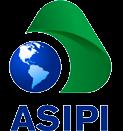 Cecilia Falconi President
Gonzalo Luzuriaga President of the Academic Committee
Cecilia Falconi President
Gonzalo Luzuriaga President of the Academic Committee
83
Margarita Romero President of the Logistics Committee
In a pleasant reception enlivened with music and with the satisfaction of having culminated an event in which the Ecuadorians made us feel at home, we had a great closing.


84
Agroup of participants then embarked on the Miske Appellation of Origin Route and had the opportunity to taste the Cayambe sponge cake, the first Guaranteed Traditional Specialty of Ecuador and the Americas. See

you later Quito
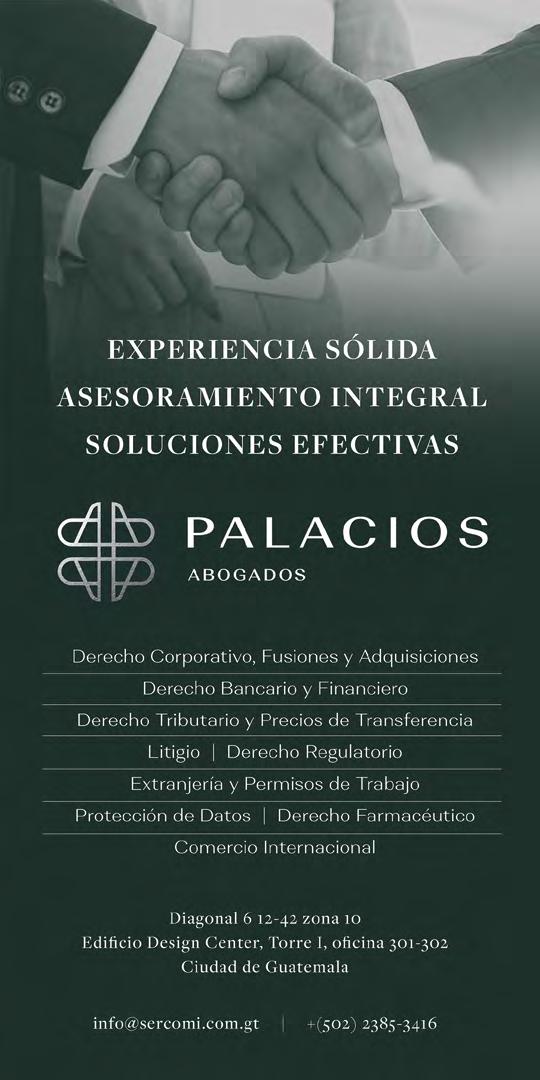

we will be back soon!

INSTITUTIONAL SPONSORS

86
GOLD SPONSORS
ACADEMIC PARTNER
MEDIA SPONSORS
NEWSLETTER SPONSORS
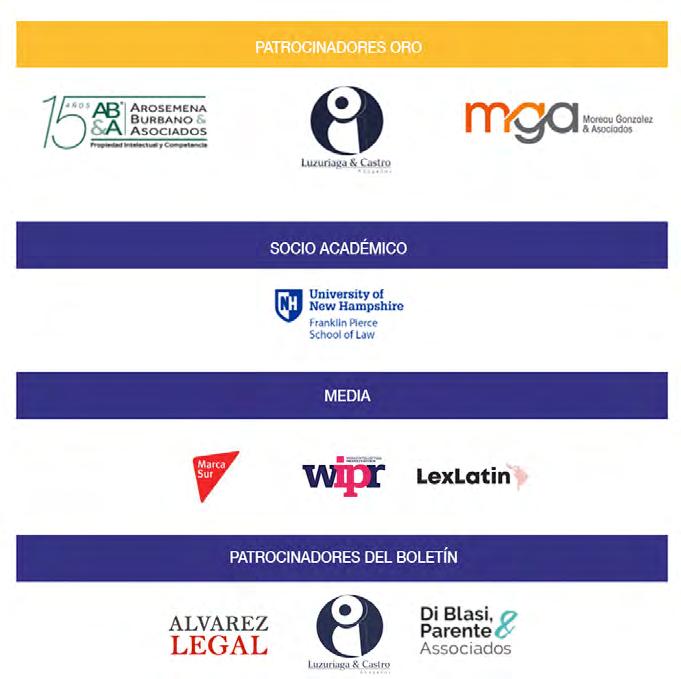
87
Now, with our minds on our next event, we invite you all to join us in Mexico City from December 3 - 6, 2023 to celebrate the XXII Congress of the Association
It will be an unprecedented event!
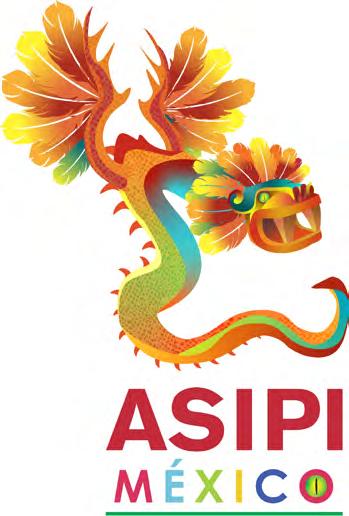
88
RESERVED SPACE AMPPI
On January 1st, 2023, the new Board of Directors of the Mexican Association for the Protection of Intellectual Property (AMPPI) took up its duties. This is a body that has become one of the most traditional professional associations in Mexico and which I have the honor of chairing for the 2023-2024 biennium.

While preparing this paper for our sister association ASIPI, I reminisced about the invitations I received from my mentors, Lic. Sergio Olivares Rodriguez, Lic. César Ramos, and Sergio Olivares Lobato, to join AMPPI several years ago. They emphasized the importance of learning to coexist and engage with my peers and colleagues within the association’s framework. As a specialized firm in the field, they would say, “we must support AMPPI.” At that time, I didn’t fully understand why, but in my involvement with AMPPI, it didn’t take long for me to witness the virtuous environment that resulted from the interaction among colleagues, competitors, and authorities.
President
Since my beginning in the association, I have witnessed how AMPPI has been a facilitator, mediator, and promoter of the relationship between its affiliates, as well as between us and the numerous authorities.

The association is a space for intellectual study and reflection to achieve a better understanding and defense of copyrights, patents, trademarks, and other related rights and figures.
At the same time, our activity, as specialists in the field of intellectual property allows and binds us to promote the benefits generated by the creation and industrial, commercial, technological, and artistic development.
We are aware that the challenges in this area are not minor. In Mexico we have new procedural challenges, such as the possibility of claiming damages derived from the violation of industrial property rights directly before the civil courts, which will link us even more to other authorities different from the traditional ones regarding intellectual property matters.
89
José Alejandro Luna F.
AMPPI
The battle we face is not only legal but also cultural since eight out of ten Mexicans consume apocryphal products.
In addition, intellectual property figures are always changing, dynamic, and must be transformed at the same speed as the fast technological race nowadays in areas such as the metaverse and artificial intelligence.
The Work Plan that we, the Board of Directors have elaborated can be structured in the following four points:
1. To improve the association’s communication, both internally and externally.
2. To promote and channel a culture of intellectual property.
3. To seek the improvement of the legal and regulatory ecosystem of intellectual property and related matters.
4. To promote our association and protect rights holders against improvisation, lack of professionalism, and fraud.
To achieve the first point of the communication, we have worked and will continue to improve internal promotion and transparency in the activities of the entire Board.
Regarding the promotion of a culture of intellectual property, we are working hand to hand with digital communication professionals so that they can recommend the way, manner, and channels to make our messages known to the outside, aimed at the sophisticated public, without neglecting the end user of the system, who may be a small businessman, an inventor or developer, the consumer of products and services and considering students, young people, girls, and boys.
Speaking of young people and students, we consider them to be fundamental sectors. Therefore, we will soon propose the creation of a youth committee, as we are convinced that the future of the association, and of the matter lies precisely in them.
Regarding the Intellectual Property ecosystem, the weakness of the rule of law and the absence of legal certainty are negative and unacceptable factors for our association.
In this sense, it is essential for us to be agents of change in our society and promoters of a culture of respect for the law.
For this reason, we will start from home. We will take up and complete the internal Code of Ethics, which will guide our actions in accordance with the highest standards.
We want to have a positive impact on regulations based on the experience we have accumulated, our professional practice and the constant study of international standards and best practices.
On the other hand, we want to invigorate our international presence. For this reason, we are grateful and honored by the invitation extended to us by the President of ASIPI, Enrique Díaz, and its Council to publish this article.
Regarding the fourth point that mentions the promotion of the association, we will seek alliances and the collegiality of our associates.
We are working on the implementation of the use of our certification mark, which will distinguish intellectual property practitioners with the technical skills, professionalism, ethics, and experience to represent rights holders. This is not aimed to exclude anyone who wants to dedicate themselves to our beloved field but to avoid deceit, fraud, and improper representation of rights holders.
To preside over the largest intellectual property association in Mexico, the AMPPI, is an honor and one of my greatest professional desires. But this feeling of excitement is not separated from a great sense of responsibility.
I thank the AMPPISTS, for the trust they have placed in me, the Board of Directors and the Extended Board that will accompany me in this project. Our association brings together diverse individual interests, but we are united by common objectives.
In AMPPI there are not, nor should there be, internal enemies, but rather joint efforts to fight the apocryphal underworld, fraud and repress unfair competition.
In the Board of Directors of AMPPI, we assume the challenge that has been entrusted to us and we are confident that the direction we are heading in is the right one. But that will not prevent us from maintaining an open dialogue and an attentive ear to adjust the course when necessary.
Our commitment is clear, we will work with the best intentions and under the protection of the bylaws to strengthen, defend and guarantee the general interest of our Association.
José Alejandro Luna F.
90
INTERVIEW WITH ECTA PRESIDENT MLADEN VUKMIR

Read about Mladen’s path within ECTA (formerly European Communities Trademark Association), his strong link to ASIPI and Latin America, and ECTA’s related activities.
1) Please introduce yourself and your path within ECTA
Thank you for your interest in ECTA, a European association based in Brussels that primarily acts in the areas of trade marks, designs, copyright, internet, geographical indications, anti-counterfeiting, data, and international trade, and prides itself on raising the level of excellence of the IP profession.
What attracted me to become an ECTA member were the facts that Croatia joined the EU in 2013 and I have joined the ranks of the EU trade mark and design representatives. Thanks to ECTA and its role as a recognised stakeholder for EU institutions, I gained the precious opportunity to contribute to the development of EU legislation and assist, as a lawyer, many EU businesses. Above all, I have enjoyed ECTA’s pleasant collegiality and constructive atmosphere, which allowed me to build a reliable network of peers and grow both professionally and personally. I have served on the ECTA Supervisory Board and joined the Board of Directors in 2018, becoming President in June last year. In 2016, I was also part of the Local Organizing Committee when the ECTA Annual Conference was held in my home country, Croatia, in the city of Dubrovnik.
In the past, I have also been an active member of other IP associations, such as AIPPI, INTA, or LES, gaining an understanding of how important it is for an independent IP professional to associate and be able to amplify one’s impact on the IP systems in general.
2) What is your link with ASIPI and Latin America?
My links to Latin America run rather deep.
During my studies at the University of New Hampshire Franklin Pierce School of Law, Master of Intellectual Property Program, I have made excellent friends with fellow students from Mexico, Brazil and Argentina and have had the first mutual exchanges of intercultural knowledge. I have then started visiting Mexico and have developed a deeper understanding of the issues that are specific to each Latin American country and those that are common to more of them. I have met my future wife at that point and have started speaking Spanish within our family as she is Argentinean. Traveling with her and on business I have started learning about other countries in detail and have by now visited Panama, Colombia, Chile, Uruguay, Argentina, Mexico and Brazil. I obviously still need to visit many others, yet the feeling of familiarity has already settled in.
I attended my first ASIPI Conference in Buenos Aires some twenty years ago because I wished to deepen my contacts with Latin American IP professionals. I quickly learned about the cordial collegiality that characterises the ASIPI community and its predisposition for welcoming
91
new attendees. Most of the ASIPI Presidents over the last couple of decades were my personal friends and colleagues, who I had known prior to their prestigious ASIPI position. I was, therefore, always kept abreast of the formal and informal developments within ASIPI
3) Is ECTA following IP developments in Latin America?



I personally carefully followed the gradual path of Latin American economies joining the international integration processes and adhering to the treaties, that many other countries on other continents had already decided to join.
ECTA, despite being a European association, is also keeping a very close eye on the IP developments in Latin America through one of our specialised Committees, the International Trade Committee. Its task force on Latin America follows relevant IP developments and updates, providing input wherever possible. We also regularly exchange information with relevant Directorate-Generals of the European Commission to enrich our mutual understanding of the paths of international trade and the development in the IP field. Also, the WIPO-Link Committee is closely following the news about the accession of Latin countries to international IP treaties.
We are very happy that ECTA has many members from Latin America who wish to engage with European colleagues and stay up to date with European IP developments. I hope their presence in our community will increase even more in the future.
At ECTA, we also fondly remember the Annual Conference organised together with ASIPI in Barcelona in 2010. The event was a great example of a mutually beneficial exchange that helped us get closer and work better together - I look forward to organising other events or initiatives together soon.
4) What are the most relevant ongoing and upcoming initiatives at ECTA?
The core of ECTA activities is the regular exchange with institutions, particularly EUIPO, WIPO and European Commission, to better follow and contribute to the EU and global IP reforms, such as the current designs and GIs reforms.
Besides this, there are several other important ongoing initiatives at ECTA. First of all, we are developing connections with universities as we are convinced that the IP profession can gain a lot from the direct involvement of IP scholars and researchers. Although we are primarily an association of IP professionals, we are also working to deepen industry contacts and increase the mutual benefit between our corporate members and the ECTA community at large. After all, our entire IP service is here to serve the needs of the business and industry.
Rather than remaining at the EU level only, we have recently also started reaching out to the national IP institutions and eco-systems by establishing mutual cooperation.
Last but not least, our priorities are the empowerment of younger professionals both in the legal profession and our association, and the increased attention to diversity and inclusion matters by establishing a dedicated task force.
When it comes to learning and networking opportunities, ECTA organises throughout the year several events, both onsite and online. Besides the ECTA Alicante Round Table, ECTA ®etreat and various webinars, the most important ones are certainly the ECTA Autumn Meeting for Supervisory Board and Committee members only, this year in Turin on 12-14 October 2023, and the ECTA Annual Conference, next year in Antwerp on 19-22 June 2024, entitled ‘Many Facets of IP’, where ASIPI members are very much welcome to participate.
ECTA contact details: Rue des Colonies 18/24, Box 8, 8th Floor, BE-1000, Brussels, Belgium Tel: +32/2 513 52 85 Fax: + 32/2 5130914 / E-mail: ecta@ecta.org / Website: www.ecta.org
LinkedIn: ECTA (oficial) Twitter: @ECTABrussels 92
Mladen Vukmir, ECTA President Vukmir & Associates, HR mladen.vukmir@vukmir.net
UPCOMING EVENTS
Date Organization Place Event Information
August 20 - 22 ABPI Rio de Janeiro, Brazil 60th Anniversary & 43rd Congress https://abpi.org.br/en/events/
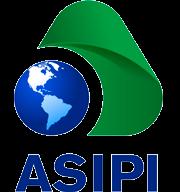
September 10 - 12 IPO Boston, MA 2023 IPO Annual Meeting https://ipo.org/index.php/event/ipo-annualmeeting-3/
September 19 - 22 MARQUES Berlin, Germany 37th Annual Conference https://www.marques.org/events/
October 4 - 7 FICPI London, United Kingdom 21st Open Forum https://ficpi.org/events/event/ficpi-21stopen-forum
October 11 - 13 IPIC Winnipeg, Manitoba 2023 Annual Meeting https://www.ipic.org/
October 19 - 21 AIPLA National Harbor, MD 2023 Annual Meeting https://www.aipla.org/detail/event/2023/10/19/ default-calendar/aipla-2023-annual-meeting
October 22 - 25 AIPPI Istanbul, Turkey 2023 AIPPI World Congress https://www.aippi.org/event/2023-aippi-worldcongress-in-istanbul/
November 3 - 7 APAA Singapore 20th General Assembly and 74th & 75th Council Meetings
November 14 - 17 INTA Houston, TX Leadership Meeting
https://apaa2023.com/
https://www.inta.org/events/2023-leadershipmeeting/
December 3 - 6 ASIPI Mexico DF ASIPI Congress www.asipi.org
93
ASIPI is pleased to announce the incorporation and welcome our new associates
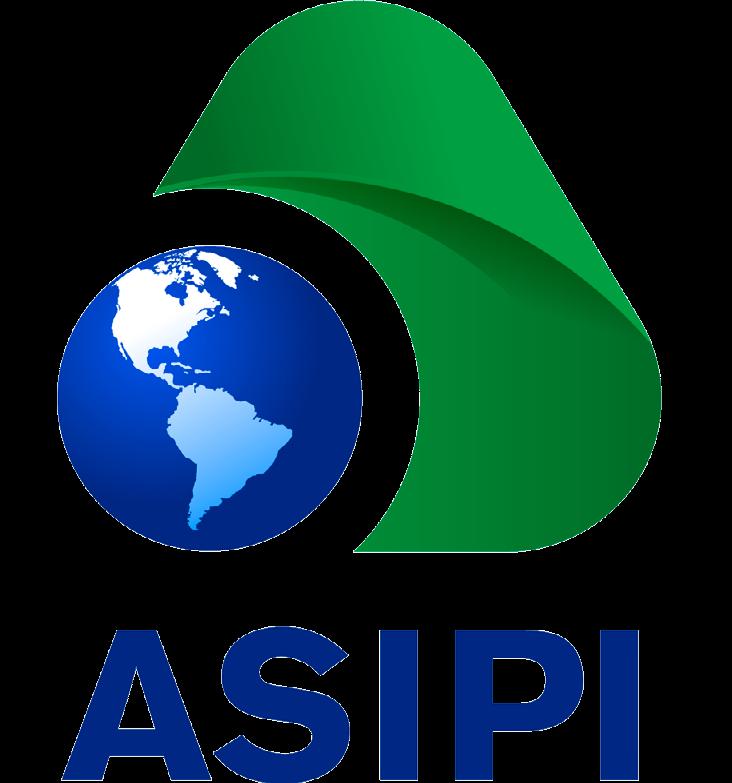
Fiorella Gagliardo
Alysa Arcos
Barbara Porcario
Alberto Brown
Fátima Espinal
Mercadolibre, Inc.
María Paula Salgado
María Belén Rivera
Keesha Fleming Lake
Paola Castro
Camila Mateus
Araceli González
María Fernanda González
Daniel González
José Roberto González
Eugenio Hoss
Juan Villazón
Crealegis S.A.
Pérez Bustamante & Ponce Abogados Cia. Ltda.
Achával Porcario San Juan
Almeida Guzmán & Asociados
Torres Legal
Paula Fernandez Pfizenmaier
Luzuriaga & Castro Abogados
Meythaler & Zambrano Abogados
Complete Intellectual Property Services
CASTROIP
Pérez Bustamante & Ponce Abogados Cia. Ltda.
Olmedo abogados
Basham, Ringe y Correa, S.C.
UT Patentes Compañía Colombiana de Propiedad Intelectual S.A.S.
Wissen, Grupo Impulsor Empresarial
Marval O´Farrell Mairal
Haug Partners, LLP
Ecuador
Ecuador Argentina
Ecuador
El Salvador
Argentina
Ecuador
Ecuador
Anguilla
Costa Rica
Ecuador
Paraguay
Mexico
Colombia Mexico
Argentina
United States
Carlos Alfonso Espín
Diego Chijane
Oscar Reyes
Victor Kronemberger
Arleen Castillo
Andrés Rodríguez
Alfonso Diez de Rivera
Laura Castillo
Dafne Ramos
Ana Laura Cubero
Leonardo Bonilla
Pablo Torres
José Roberto de Almeida Junior
Sara Larios
Adriana González
Ana Carolina Blanco
Lauden Law
Cikato
Bustamante Fabara
Dannemann Siemsen
INNVENTIVA
Novus Estrategias
Elzaburu
Innventiva Legal
MCG LAW FIRM
Lexincorp Abogados
Estudio Jurídico de Propiedad Intelectual, Julio C. Guerrero B. S.A.
PROVIMARCAS
Mattos Filho Advogados
Mayora IP
Dentons Guevara & Gutierrez
Blanche
Ecuador
Uruguay
Ecuador
Brazil
Dominican Republic
Colombia
Spain
Dominican Republic
Perú
Costa Rica
Ecuador
Colombia
Brazil
Guatemala
Bolivia
Dominican Republic
WELCOME
Name Name Country Country Firm / Company Firm / Company The ASIPI
94
family
Andrea Quintana
Ana Haydee Fontes
Juanita Pérez- Botero
Efraín Olmedo
Mikel Vásquez
Desiree Russo
Israel Ledesma
Patricio María Albornoz
Ivonne Adum
Bernardita Dittus
Sofía Viteri
Gonzalo Menendez
Juan Pablo Serrano
Sasha Mandakovic
Fredy Sánchez
Alvaro Murillo
Verónica Chiriboga
Lorena Soto
WELCOME
ASIPI is pleased to announce the incorporation and welcome our new associates

Consulegis Abogados
Fuentes Carrasco & Asoc.
Gómez Pinzón Abogados
Santamarina y Steta, S.C.
GR Lex Américas
PUMA SE
Jauregui y Del Valle, S.C.
Bomchil
Arosemena Burbano & Asociados
Estudio Jurídico de Propiedad Intelectual Creativo EPIC
Robalino Abogados
IDeas Trademarks and Patents
Flor Bustamante Pizarro & Hurtado S.A.
Falconi Puig Abogados
Merino & Asociados
Luzuriaga y Castro Abogados
Dentons Paz Horowitz
Arosemena Burbano & Asociados Cía.
Ltda.
Juliana Alves Melo
Marianela Espinoza
David Arturo Acosta
Emilia Andrade
Kristel Meza
Yanira Becerra
Diego Cervieri
Laura Hernández
Filipe Fonteles Cabral
Manuel Fernández de Córdoba
Roberto Arguello
Sebastián Jiménez
Renzo F. Scavia
Santiago Cevallos
Marco Andrés Avila
Ignacio Alamos
Esteban Argudo
Dannemann, Siemsen, Bigler & Ipanema Moreira
ULPIK
ASPEN Legal
Sur Legal
Osha Bergman Watanabe & Burton
Martinot Abogados
Cervieri Monsuarez
Alessandri Abogados
Dannemann, Siemsen, Bigler & Ipanema Moreira
Quevedo & Ponce
IDEAS IPS
COLBS Estudio Legal
Scavia & Scavia
Durini & Guerrero Abogados
Sur Legal Estudio Jurídico
Chirgwin
Argudo Alvarado & Bustamante Firma
Legal
Brazil
Ecuador
Venezuela
Ecuador
United States
Peru
Uruguay
Chile
Brazil
Ecuador
Nicaragua
Costa Rica
Peru
Ecuador
Ecuador
Chile
Ecuador
Name Name Country Country Firm / Company Firm / Company
Ecuador Mexico Colombia Mexico Venezuela Germany Mexico Argentina Ecuador Chile Ecuador Guatemala Ecuador Ecuador Colombia Ecuador Ecuador Ecuador
continues
95
growing!
YOUTH ZONE
They are the new generation that will lead our association in the future and whose ideas and initiatives help us to adapt more quickly to changes. Their voice will always be heard in ASIPI and their commitment will always be valued. In this edition, we are pleased to share the testimonials of our members Stephanie Arevalo from Guatemala and Pablo Torres from Colombia.
Ibegan my involvement with ASIPI through the courses offered by the ASIPIACADEMY program. I found the courses to be innovative, with high-quality standards, and taught by recognized professionals in the Intellectual Property field. With this initial experience with ASIPI, I decided to actively join the association, and I am currently part of the Entertainment Committee and the E-sports and Video Games Club.
Being part of these groups has allowed me to share professional experiences with lawyers from all Latin American countries and discuss relevant topics or current news that affect our profession. Undoubtedly, these groups allow me to expand my knowledge while enjoying conversations with other colleagues.

I would also like to highlight the webinars organized by ASIPI since all the topics they address are current and allow discussion from different perspectives on innovative subjects.
My experience in ASIPI has been wonderful as it has allowed me to expand my knowledge, especially in topics that I am passionate about such as technology, E-sports and Video Games. It has allowed me to meet respected colleagues throughout the region who have been an example for me and have helped me to continue strengthening my professional growth in such an enriching field as Intellectual Property.
For ASIPI the participation of young members is very important
Stephanie Arévalo
96
Ihave been a member of since 2023, and my connection comes after 7 years of experience in the field of intellectual property.


My first in-person event in was during the Work Sessions held in Medellin in 2022, an enriching and rewarding experience that allowed me to welcome colleagues, who are now friends, to my city. For many years, we had only shared a phone call or a video conference, and this event strengthened both our business and, mainly, our personal relationships.
Now as a member, I hope to continue growing through Intellectual Property, with a strong professional commitment and high expectations within the
ON THE radar OBITUARIES
Heartfelt departure of Carlos Terra
On March 5th, our dear friend Carlos Terra departed to eternity. Carlos was born in Uruguay and studied electronic engineering in his native country. He established his family in Venezuela, where he also founded the firm ECV Asociados, where he worked diligently in the field of intellectual property.
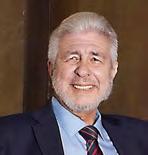
He stood out not only for his professional excellence but also for his human qualities and his incomparable charisma. Our heartfelt condolences go out to his family and to the members of his second home, ECV Abogados. We will feel his physical absence, but he will always live among us through the fondest memories.
Rest in peace, Elizabeth Flores
It was with great sadness that on April 12th, we received the news of the passing of our Guatemalan partner, Elizabeth Flores. Elizabeth was an associate at Mayora IP in Guatemala and an active member of our association. Our heartfelt condolences go out to her family and Mayora IP.
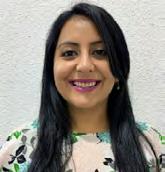
Institutional Anniversaries
Bolivia
On June 27th, Landívar & Landívar celebrated its 62nd anniversary with the slogan “Experience and Innovation, Legal Advice with Value”. Congratulations on this journey!
Colombia
OlarteMoure celebrates its 20th anniversary this year, commemorating this important milestone of permanence in the market and driving change through innovation with this image of their logo. Happy 20th anniversary!

commemorating the date of its founding in the city of Quito. Congratulations!
Ecuador
In commemoration of its 75th anniversary, the firm Bermeo & Bermeo celebrated with its friends, colleagues and clients during a countryside gathering last June. Congratulations, and may there be many more years to come!
Dominican Republic
Orange IP celebrated its third anniversary in January 2023, and its founding partner Carmen Prieto Villegas celebrated with a thanksgiving mass with clients, family, and friends. Here’s to many more years of celebration!
Ecuador
The law firm Falconi Puig Abogados celebrated its golden anniversary last June, together with colleagues, friends and clients,
Dominican Republic
JJ Roca & Asociados commemorates its 25th anniversary this year and celebrates it with an anniversary logo and this expression of grati-
98
tude: “We are grateful first and foremost to God, to whom we owe everything, and to our clients, partners, collaborators, colleagues, and friends for the trust and support throughout all these years! Happy Silver Anniversary!”
Dominican Republic
“The firm Innventiva Legal is getting ready to celebrate its 14th anniversary, and they do so by expressing their gratitude to the clients and colleagues who have accompanied them throughout these years of professional trajectory. Many congratulations!”
Incorporations, Promotions and Appointments
Ecuador
PBP has added Dr. Margarita Romero Rosales to their team, who joins the firm as a partner in the Intellectual Property department. Best wishes to Margarita!
Ecuador
Dr. Carmen Robayo, partner of the firm Venamerica, has been appointed president of the Intellectual Property Commission of ICC Ecuador. Congratulations, Carmen!
Ecuador
Consulegis Abogados, a firm based in Guayaquil, announces the appointment of Dr. Andrea Quintana as the leader of the Intellectual Property area. Congratulations, Andrea!
Ecuador
With the acquisition of the law firm De la Pared Plaza, Falconi Puig has added attorney Johnny De La Pared and his entire team, expanding operations in the city of Guayaquil. They also brought in Mauricio Velandia, a Colombian litigator, as off-counsel of the firm. May the growth continue!
Office Changes
Dominican Republic
Orange IP moved to new offices in a modern commercial plaza located at Av. Sarasota #34, Centro Comercial Unidos, 2nd Level, Bella Vista, 10112, Santo Domingo. Congratulations on the new offices!
Costa Rica
Arias Costa Rica inaugurated its new offices on the ninth floor of the recently constructed Business Center de la Sabana in San José. Congratulations!
Paraguay
Berken IP, moved to new offices in the Belgrano neighborhood, in the city of Buenos Aires. The new offices are located near the future “Parque de Innovación”, which will bring together the main universities and innovative companies. Congratulations on the change!
Brand, Logo and Website Changes
Ecuador
In February 2023, PBP renewed its brand, refreshing the corporate image of the firm, which can also be seen on their website www.pbplaw.com

Mexico
The Mexican firm Wissen relaunched its website, which can be visited at www.wissen.mx
Peru
Rosello Abogados relaunched its image and website. The website can be visited at the following address: rossellolaw.com

Ecuador
Julio C. Guerrero now has a new image focused on its new institutional logo and website www.guerrero.law New Firm
Paraguay

Intelectia a new Paraguayan firm, opens its operations to handle intellectual property and audiovisual law matters. The office is located in the Las Mercedes neighborhood, in the city of Asunción. Contact email: cfranco@intelectia.com.py

99
A LA CARTE
If you weren’t able to join us live in any of our webinars, couldn’t listen to our podcasts yet, or want to know what topics were covered in our roundtables, now you have the opportunity to access this content and stay up to date on various intellectual property and related topics, at the time you want.
Webinars
New ASIPI-UNH Franklin Pierce School of Law Scholarships Regulatory Trends in Privacy and Data Protection
February 2, 2023
https://us02web.zoom.us/rec/share/InJU49IsW4ab6Frbg3rlLHn922KzZ__ Om5Z_J2OfOpSvItsJNWlEg_tc-W1oLT_.8mXsW05B7vd99VO3 Código de acceso: rl8Y71!@
Megan Carpenter, Sarah Dorner, Micky Minhas, Enrique Díaz, Martín Pittaluga (M)
Justifying IP. Strategic Implementation Trends for Development
February 16, 2023
“https://us02web.zoom.us/rec/share/772bt4XDkuGRNrJs3pJEo3xzxzT AEArIF-th9fyZAAgsI4_SVBFPrYJZHg7YS98E.a80ZxnZr2Qfoe1Ur
Código de acceso: C9k@C21T”
María Solange Maqueo, Pablo Palazzi, Daniela González, Johana Aguirre (M)
The Hague Agreement-Perspectives for Latin America Women Who Inspire
February 23, 2023
NO RECORDING
Alfredo Corral, Enrique Díaz, Luis Henriquez
March 2, 2023
“https://us02web.zoom.us/rec/share/fiXkMcVYMVxHx4X11cBGYwdtjx oSduD6uqhdtwRThee1a43Qn6UplKNCQJjgJsLm.wm09A1u-U5zPJC7o
Código de acceso: ^Q@k5^Pg”
Matías Valenzuela, Janett Lumbreras, Cinthia Puente, Luis Alberto Márquez (M)
March 8, 2023
“https://us02web.zoom.us/rec/share/53B2ydIqrXOOV8pUuzH6dxnbu4kqSA-jzHdtFwBceEQIv5fV1SA4Og_911y1ZIH.o7rdWdlr yhqeUHiC?startTime=1678290913000
Código de acceso: p#pbjZ@7”
Valentina Moreno, Laura Jaramillo, Mariel Hawley, Matías Noetinger (M)
Adult Entertainment Industry Legal Trends and Challenges
March 16, 2023
“https://us02web.zoom.us/rec/share/muKJAyWqYYpM6bLQDY_q3HIJ40CerroJzvJ_zM8v57uwccSWmCigzvg70ojot3l.nzS9sVullj0C8FpZ
Código de acceso: bK*6AH79”
Eduardo Varela, Eduardo de la Parra, Marc Randazza, Marcela Mancia (M)
NFTs and Intellectual Property Rights
March 23, 2023
Trends in Compensation and Benefits Schemes in the Service Market: How to Improve the Employee Value Offering March 30, 2023
“https://us02web.zoom.us/rec/share/IkkeHxgdkyPFbXxKHdXIevukoCIJ Qkw94AGIjBWnxyzfudxmc-hhS3ZlfV26ds5t.IrJGnH8StB6U8d4k
Código de acceso: Cz..dQ5e”
“https://us02web.zoom.us/rec/share/B3XyuIWp7p15UVsSl6rMvt7d9E CozZWUEtMDJF5AuD5iBR9A--ocHVCn_a8wjRiW.3iV0qug8NzDijVUM
Código de acceso: UMC.$u6j”
Eleni Kikkini, Gonzalo Ramírez, Juan Andrés Vanrell, LouisPierre Gavelle (M)
Date Link Participants
Title
José Manuel Acosta, María Paula Ospina, Juan Esteban Ponce (M)
100
Title
Corporate experience in the fight against counterfeiting and piracy
Non-Traditional Brands - Comparative Analysis, LATAM, USA and Europe
EU Legal Framework for IP Protection of Genetic Resources – Part I
Date Link Participants
April 13, 2023
April 20, 2023
April 25, 2023
“https://us02web.zoom.us/rec/share/V3ljtQafrr-HVBtOl92YUKT8oKM7 3GOhK66BuAZjxqmqHyr70fUd7Mx47IEazz-k.VACX_MTBrwc8r8E_ Código de acceso: &u^=2P?f”
“https://us02web.zoom.us/rec/share/4RRJ333xh_334UjQQ086g-pYdY w9ESh4o21iilOyzlo8y553FKcG9N3l7rFloqqU.hvY22uQO0r6bzvwL
Código de acceso: %9xE%ax@”
Alfonso Videche, Arturo Ishbak González, Cecilia Falconi (M)
Micheline Kelly Johnson, Elia Sugrañes, María José Lamus, José Juan Méndez (M)
Takeshi Komatani, Dafne Ramos, Fleur TuinzingWesterhuis, Begoña Venero NO RECORDING
Women and IP: Accelerating Innovation and Creativity April 26, 2023
Current events and challenges for the protection of Plant Varieties in Europe and Latin America. Plant Breeder’s Rights vs. Patents.
The impact of ethics on compliance programs.
May 4, 2023
“https://us02web.zoom.us/rec/share/FbxR9SXjBEg_ MMte_7IkKdfna95Sg-cDsYLDJ8yxa5jPN1CQ7Iej1vNp1gLFPBA.513R08 PruZxzBnK4
Código de acceso: 4@W0n46E”
“https://us02web.zoom.us/rec/share/OyL4UjW3Z3EA1ZPB56xFiOcH3k dNau6CNhmlTawBwVYg2XkxpXf5fNWr4fKf8VBk._0N1uIVFNyecp6RX
Código de acceso: %9m*m.d4”
Stanley Kowalski, Megan Carpenter, Matías Noetinger (M)
Franceso Mattina, Miguel Rapela, Martína Damian Ré
May 11, 2023
“https://us02web.zoom.us/rec/share/WOpznB7Qw1_QEU87qKZj2HI1Rk-MIC9iOPO_CTrrO4HX5HeWHRfZoo_rSiNRxdu.9u0BnGD8 ZnHNy9I2?startTime=1683820723000
Código de acceso: 9^6W=1D*”
Nuri Cortina, Martín Michaus (M)
Challenging pharmaceutical and biological patents by generics and biosimilars.
May 25, 2023
“https://us02web.zoom.us/rec/share/JBtEtYC1xC7q0tiIRUvmYl70YN6H Zj2k6mElp-0r-g9_ejWE1TjW9WzGzTr96PlY.y7p_BcU0whcLsPqU?startTi me=1685030297000
Código de acceso: eaUn8%40”
Deepa Tiku, Alexander Agudelo, Branko Pejic, Avelina Ponce (M)
The importance of Mental Health in the professional environment - Part 2.
Intersection of IP and cultural heritage. Part !
Patent infringement in the virtual world
June 15, 2023
“https://us02web.zoom.us/rec/share/Av5ItNm2zFYJWY5bqidaI5eGZ w2LSK2GnmUP8w3s9arwaXhKWVVVAcvYcnnDTmLI.csaqt_mZ0Wlr_ b1R?startTime=1686844605000
Código de acceso: $FA#w7Pv”
Myrtha Hurtado, María Eufemia Duque, Diana Arredondo, Joana de Mattos (M)
June 20, 2023
June 22, 2023
Lily Martinet, Pier Luigi Petrillo y Aldo Modica (M) NO RECORDING
“https://us02web.zoom.us/rec/share/S_x7CZQ8QSZfcwbKmi8P4rpPAr vj7_8mCeNOg7JRQOIlkCStIvcFHaiaM3u1sVc3.q5aV3aRA5mM3QEUI
Código de acceso: 9%e6Ph13”
Alejandra Castro, Ross A. Dannenberg, Brett Slaney (M)
Fashion and video games
June 29, 2023
“https://us02web.zoom.us/rec/share/12lU7mwabVKUE6Ig2ZoOwODBAhx0v42JBnIKGc_r-a09902176NbNh9zGQK6-D5. qyGwFVd7fvYAsiWQ
Código de acceso: &0@T1*vJ”
Egle Arena, Olfa B’Chir, Erica Roque, Cristina Hernández Marti-Pérez (M)
Private Copying: What is the current situation in Ibero-America? Expert’s view
July 6, 2023
“https://us02web.zoom.us/rec/share/LfreRtSG5e5pDvzYayJzjVNJmBV31r7_ HLjCW6LeXHWTWjRGPeWf7yGAHf3SA-1m.pNcSKDdRIIkQhQe_?startTi me=1688651903000
Código de acceso: @AU34QzS”
José Antonio Súarez, Oscar Elizeche Landó, Federico Duret, Carlos Aguirre Noboa (M)
Webinars 101
Title
Digital Marketing - New Paradigms in Communication Strategies
Podcasts
Date Link Participants
January 23, 2023
https://www.youtube.com/watch?v=68leqv3YOLQ
Federico Escobar, Francisca González, Florencia Viola, Alejandro Castro y Verónica Vanrell (M)
Advergaming: Advertising with Games
Enforcement of Intellectual Property Rights by Customs Authorities at the U.S. Border
The Current Situation of the Venezuelan Patent System and its Future Vision
Piracy as a painful reality for LATAM, its effects on the industry and on digital
February 24, 2023
March 24, 2023
May 2, 2023
Miguel Angel Palacios, Alejandro Castro (M) https://www.youtube.com/watch?v=Hp9b0vbbnwk
https://www.youtube.com/watch?v=Egk-BUpiyPU
Robert Kossick, Fred Rocafort (M), Jessica Ortiz (M)
July 6, 2023
https://www.youtube.com/watch?v=lBFHh-MNVaY
https://youtu.be/AlwdxL-1WDk
Francisco Astudillo, Carolina Martínez (M), Joaquín Nuñéz (M), Margarita Romero (M)
Sujey Torres, Gonzalo Luzuriaga (M), Fred Rocafort (M)

102
Roundtable Discussions
ASIPI - Andean Community Court of Justice

Title
Date
Country Link Participants
The Clarified Act in the Framework of the Andean Community March 24, 2023
“https://us02web.zoom.us/rec/share/7XlVPTeuWD3EHY4nH j0QUlJoRPUfOpDlxSVFWbao6TK5AgUL6oLu0T86XGA3LzKm. ki6_-9Gd5Kv_oQIt?startTime=1679668880000
Passcode: R%#t5RGd”
Hugo Gómez, Carlos Moran, Gustavo García Brito, Jorge Allende, Luis Diez Canseco (M)
United States
§1782 Proceedings: Providing Foreign Attorneys with United States Federal Court Assistance in Gathering Evidence March 29, 2023
“https://us02web.zoom.us/rec/share/BfLskqMWp0iZHdznz HasB6Sggm5vF9Iqkp3X6HwdC6ExF7RZjv50nEbomqDbxQfU. ivFFMzGYkCshQPO7
Código de acceso: zt=.0$M4”
Chad Purdie, David Levine, Paola Sanchez, Fausto Sanchez, Augusto Perera (M)
Cuba Presencial
Uruguay
The Challenges of Intellectual Property in the International Sphere and in Cuba April 11, 2023
Non-Traditional Trademarks - News, New Technologies and Challenges May 8, 2023
“https://us02web.zoom.us/rec/share/TeM0A5-_-KiO85YkhO txjGnLd9sz4NxqcDeh68R2m6ZUSt2kzfgiL7KjnrGxl6gI.pXirGQ cKd86GPt3i?startTime=1683564117000
Código de acceso: !nvLi^K7”
Verónica Scotti, Natalia Paladino, Gabriela Espárrago, Diana Leandro, Federico Fischer (M)
103
EXPAND YOUR VOCABULARY
Biotechnological inventions
These are inventions related to biological material. (European Patent Convention Rule 26.2).
Biological material

Any material of human and/or other species origin that is related to human health, such as blood, plasma, serum, or saliva.
Right to data portability
Refers to the right of users to transfer their personal data from one company to another, instead of the data being exclusively owned by the collecting company.
Obsolescence
Is the process by which something becomes outdated and is no longer useful or effective for its original purpose. This can be due to various factors, such as the introduction of new and improved technologies, changes in consumer preferences, wear and degradation over time, among others. Obsolescence can apply to many different areas, from technology and electronics to consumer products and fashion.
Standard essential patents
Also known as standard-essential patents, are patents granted for inventions that serve to establish a technical standard. Technical standards are specifications and norms set in an industry to ensure that products and services are interoperable and safe.
104
Mandala / Bordado en cadeneta / Luz Elena Castrillón / 2019
CORNER OF HUMOR OR REFLEcTION

Look
He observes the world through his own eyes, delving into its shapes, colors, scents and climates, but he never adjusts his perspective because he always looks at it from the same height. One day, by accident, he notices that his shoelace is loose, he bends down and attempts to tie it. Distracted by a noise, he looks up, and the sight from this new angle leaves him perplexed, he realizes, then, that not everything appeared as he had always perceived it.
105
106
107
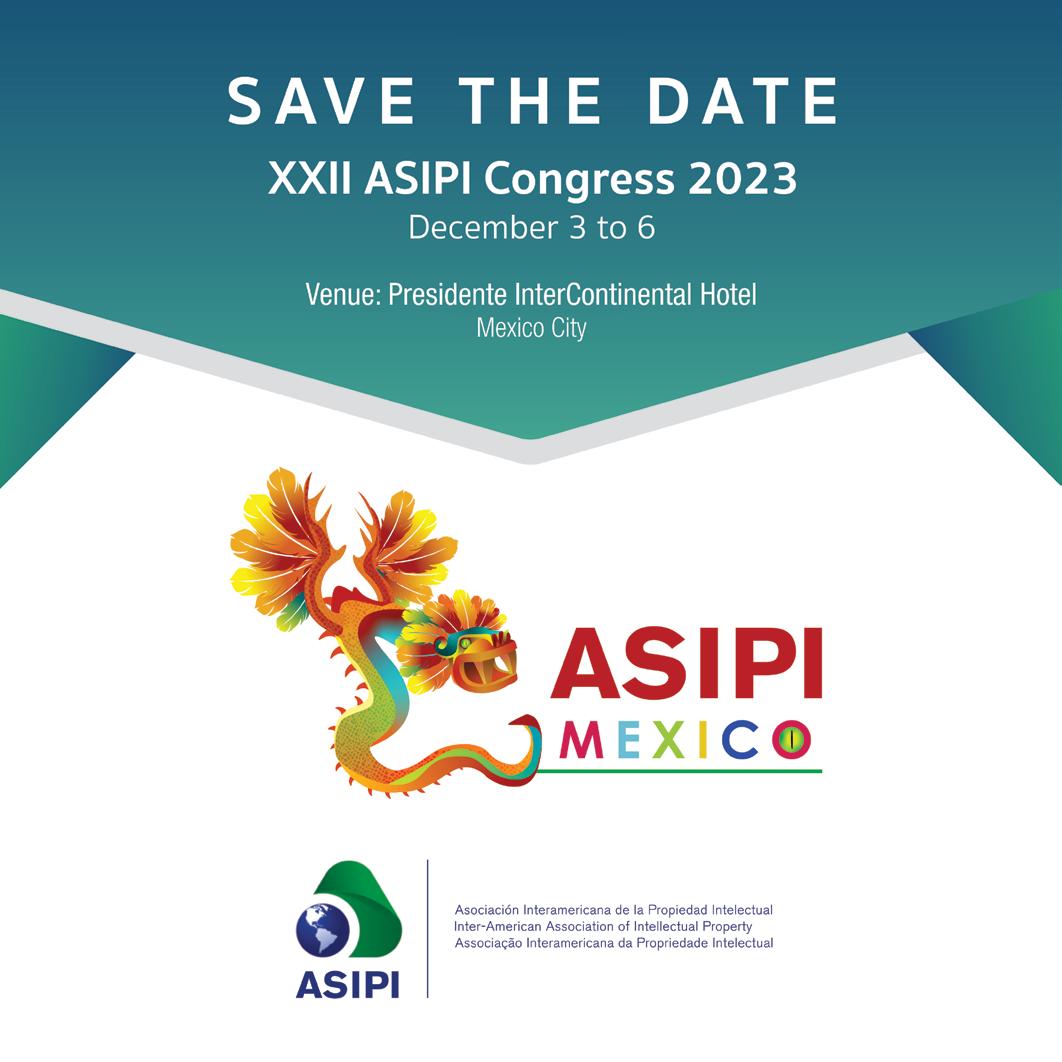
108

 Enrique Díaz President of ASIPI
Juli Gutiérrez Director
Natalia Tobón y Marcela Montañés Editors
Saúl Alvarez Lara Design
Enrique Díaz President of ASIPI
Juli Gutiérrez Director
Natalia Tobón y Marcela Montañés Editors
Saúl Alvarez Lara Design


















































































































































 Cecilia Falconi President
Gonzalo Luzuriaga President of the Academic Committee
Cecilia Falconi President
Gonzalo Luzuriaga President of the Academic Committee























